- Admission Essay
- Statement of Purpose Editing
- Personal Statement Editing
- Recommendation Letter
- Motivation Letter
- Cover Letter
- Supplemental Essay
- Letter of Continued Interest
- Scholarship Essay
- Role Model Essay
- Our Editors
- College Admission Essay Examples
- College Cover Letter Examples
- College Personal Statement Examples
- Graduate Personal Statement Examples
- Graduate Statement of Purpose Examples
- MBA Essay Examples
- MBA Personal Statement Examples
- MBA Resume Examples
- MBA Recommendation Letter Examples
- Medical School Personal Statement Examples
- Medical School Recommendation Letter Examples
- Pricing Plans
- Public Health
- Dissertation
- Research Paper
- Thesis Editing
- Academic Editing

Law School Essay & Personal Statement Editing Services
Set yourself apart in a pool of law school applicants by writing a perfect application essay.
Three Reasons Why Law Essay Editing Service Will Work for Your Admission
Many applicants rely on high GPAs and excellent test scores. But sometimes, it’s not enough to have brilliant grades to impress the picky admission committee. That’s why crafting a perfect law school personal statement is highly important for winning a place at your dream university.
After starting to work on the essay, the candidates find out that it requires a lot of time and effort to craft a personal statement of the highest quality. Moreover, educational institutions can differ in their requirements and expectations for the same type of paper.
Getting professional law proofreading assistance is an excellent opportunity to deal with all possible difficulties. We work to provide you with expert help with law school application that boosts your chances of getting into your dream university.
Learn how you can benefit from professional admission editing:
Comprehensive Analysis of Mistakes
Our law school editing service includes not only checking for possible mistakes. A professional editor will proofread the text thoroughly, correct all mistakes, and provide the necessary recommendations to improve your paper. Here are the main factors our experts pay attention to when working on your order:
- Grammar and Punctuation Accuracy. The chosen editor will eliminate typos/spelling errors and make all sentences perfectly structured and grammatically correct. Also, the expert check will help get rid of punctuation mistakes.
- Logical Structure. The essay’s structure has a significant role in comprehending the text. Thus, the expert will provide law school personal statement help for improving the paragraphs and making the text correspond to the standard essay or letter format.
- Perfect Style and Intriguing Content. Word choice, tone of voice, and wordiness—all can affect the overall impression. With comprehensive proofreading, your law school essay will be free of stylistic inconsistencies.
- Coherence Between Sentences and Paragraphs. The sentence’s flow refers to how the reader understands the text. So the paragraphs should be coherent to convey the idea correctly.
- Appropriate Format and Word Count. The format of the paper is vital for making everything look neat and professional. The same refers to the word count; some universities take it seriously. So, the editor will help follow the instructions strictly.
All these improvements will not harm your unique writing style. Our editors do not write anything for you. Instead, they provide professional advice to enhance the quality of your law statement.
Personalized Approach
We highly value your personal story, and our mission is to help you highlight your personality and win the committee’s attention. Our team of professional editors adheres to the customized approach while working with an order.
Even a tiny detail can change everything, so the specialists consider a wide scope of factors. The chosen university or program, as well as different admission papers , imply particular instructions to follow. So, be sure that we provide law school essay help according to specific requirements and your personal demands.
Extensive Experience
25+ years of work in this field helped us gain a lot of experience. Still, we are moving forward to improve our services and meet our customers’ needs. During these years, we gathered a dream team of professional editors with large expertise in admission proofreading and essay coaching.
We work with various degrees, subjects, and programs. Also, EssayEdge specialists are graduates of the most prestigious universities. So, they are aware of the specificity of the admission process at different universities, including the Ivy League. Therefore, you can stay confident that your law school paper will correspond to your dream university’s expectations.
Make Your Law School Essay Noticeable With Our Team of Experts
Understanding the specificity of the admission paper is critical for making it stand out from the crowd. Our professional law school essay editing service helps to improve various admission docs, including the following:
Law Cover Letter
It’s important to consider that a cover letter is not similar to an admission essay. These are two different documents with distinct aims. Your cover letter is necessary for providing reasonable arguments to support your candidacy. Also, it has some common features with the essay, but the format and structure differ. With the help of our cover letter law proofreading editing, you will stay confident that you’ve done your best to submit a perfect letter.
Law Personal Statement
Your law school statement should clearly define why you want to study the chosen program. Also, you need to highlight skills, experiences, and qualities, showing that you are a perfect candidate for a specific law school. And our expert editing and proofreading help with law school personal statement will be perfect for improving the quality of the paper.
Expert Tips to Improve Your Law Personal Statement
EssayEdge editors work with various degrees, types of admission papers, and subjects. You can be sure that they will consider all the instructions to help with your personal statement for the law school of your choice. All you need is to place the order and mention all specific requirements. Moreover, you can get professional assistance, from brainstorming to submitting the essay.
In addition to law school personal statement help, our editors share their knowledge in a blog and podcasts. You can also look through the admission paper samples to get ideas or inspiration for crafting your own masterpiece.
Here are some recommendations from our experts on writing an effective law school essay:
- Remember that your admission essay should be personal; do not include generalized info but highlight your unique experiences;
- Make your narrative interesting and intriguing; a boring and flat essay can completely spoil the committee’s impression;
- Avoid mentioning the same information you included in your resume, letters of recommendation, transcripts, and so on;
- Choose the best-fitting essay prompt that will demonstrate your personality from the best side;
- Proofread the essay several times to make sure you haven’t missed even a minor mistake.
- If you are not sure about the quality of your text or just want to be confident in the result, our law school admission essay editing is the right choice. Our specialists will do their best to ensure everything looks brilliant, neat, and professional.
What Makes Us Stand Out From the Rest Editing Services?
Cooperation with Professional Editors From Ivy League Schools
Just imagine that you’ve got a chance to improve your essay together with a professor from Harvard or MIT. Would you take this opportunity? Our editors from the Ivy League are ready to provide a personal statement law school help to win the admission committee’s attention. All of them are native English speakers, so you can be sure they will do everything at the top level.
Thorough Proofreading and Law School Personal Statements Advice
Together with eliminating all mistakes, the chosen editor will thoroughly proofread your paper and provide expert recommendations on how to improve your law school essay considering numerous requirements. Still, do not worry that our law school personal statement editing service will harm your unique writing style. Instead, we are working to highlight your personality and make you stand out.
Wide Range of Legal Services
Using our editing, proofreading, and essay coaching services is legal in the US and worldwide. We do not violate any admission regulations or academic integrity principles. Besides, our editors do not write any content for you. Our law school application helps to correct possible mistakes and provides expert advice on enhancing the quality of your writing.
Satisfaction Rate
Our customer satisfaction rate is 9.8/10, and we are proud that our clients rank our services highly. Moreover, 98% of our clients recommend our services, claiming that our services boosted their chances of getting into the chosen institution and helped them win the attention of the pickiest committees.
Higher Chances for Application Worldwide
We help prepare admission papers for colleges and universities around the world . Our specialists are aware of the specificity of the application process in different institutions and consider particular requirements while working on your order.
EssayEdge > Law Essay Editing
Why Choose Us
Law school application.
The application process is tough, especially when you apply to a law school, so let your personal statement argue your case. Writing a polished essay is the perfect way to show that you are much more than your LSAT score or GPA.
When you apply to a law school, personal statement brainstorming with an EssayEdge editor as your guide may be helpful. Please take a look at our Sample Essay to see how it works.
Write this essay to introduce yourself and show your potential contribution to the community. Law school personal statement brainstorming can help communicate your thoughts effectively.
This essay describes why you want to participate in a particular program or enter a specific law school. Professional brainstorming with our experts may help you define your goals and write them down.
Some law schools accept additional admission essays, focusing on your personality or the diversity that you will bring to the school. A well-written additional essay is your chance to stand out.
Always submit a resume if you have a chance to do so. It shows who you are and what you’ve accomplished. Keep in mind that you shouldn’t transform a resume into your personal statement.
lmost every law school requires letters of recommendation. You can submit either professional or academic LOR. We can help you find out what kind of letter will work best for you.
Law schools ask candidates to disclose any past misconduct, so applicants might want to submit an addendum explaining their reasons. Our experts will help you craft a perfect one.
Types of documents
Docs we can help with.
In most law schools, applicants are required to submit a personal statement and some optional components, including character and fitness questions, resume, addendum, and other documents.
Be sure to read your school’s application instructions carefully and let our editors help you polish each document.
Experienced Law Essay Editors
Our editors graduated from law schools and developed expertise in this field to help you write a competitive personal statement.

"I am experienced editing undergraduate and graduate school application materials, academic papers and theses."
College; Graduate; Law; MBA; Medical School;

"What started out as a part-time job to pay for my college tuition quickly grew into a passion for admissions essay editing and counseling."
College; Graduate; Law; MBA; Medical School; Premier package;

"My aim is to ensure your unique skills, experience, and attributes are highlighted and shine through in your essays."
College; Cover Letter; Dental; Graduate; Law; MBA; Medical School; Premier package;

"I perfect a client's writing while also addressing critical areas that need improvement, all while maintaining the client's unique voice."

"I have a unique perspective on the college admissions process and on the job application process."

"I am excited to help take your writing to the next level."
College; Education; Graduate; Law; MBA;
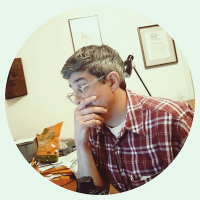
" I improve an essay through specific and constructive feedback."

“I’m here to help you unleash the power of your writing through clarity, language, and structure.”
College; Law; MBA; Medical School;
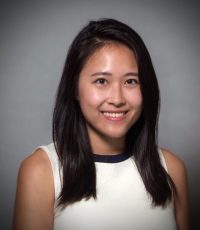
"I pride myself on my detail-oriented and conscientious editing skills that I am sure to tailor to the individual needs of each client."

"I can handle most tasks, including resumes and applications for college and graduate studies. "

"I like to put my language skills to good use on essays from all fields, but especially those in Medicine and Business."
Law; MBA; Medical School;

I love supporting students with admissions essays, cover letters, academic essays, theses and dissertations.
College; Education; Graduate; Law; MBA; Premier package;

"My approach focuses on clarity and conciseness"

" I am experienced editing admissions essays, recommendation letters, as well as academic papers and theses."
College; Cover Letter; Graduate; Law; Medical School;
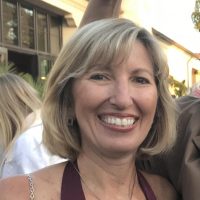
"I enjoy getting to know my customers and helping them reach their undergraduate and professional goals."

"I have a deep love for the written word and have thoroughly enjoyed my time working with high schoolers to strengthen their writing skills."

"I have a great deal of experience assisting those applying to law school and LL.M. programs."
Cover Letter; Graduate; Law; MBA; Medical School;

"I find great joy and satisfaction in crafting precise language, and in helping people tell their stories with honesty and style"

"I am well versed in working with both undergraduate and graduate application essays."

"Send me your admissions essays, research proposals, academic papers, and theses. Let’s get to work!”
College; Education; Law; MBA; Medical School;

"My goal is to work with customers and help present their ideas in their own words in a professional and grammatically sound manner."

"I love supporting students so they can achieve more in their academic writing, from theses to admissions materials like personal statements."
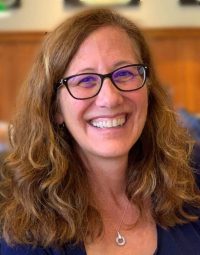
"I enjoy helping clients tell their particular stories: who they are at heart and how they got to where they are now in their lives."

"I am looking forward to helping countless new students achieve their academic aspirations."
College; Cover Letter; Graduate; Law; MBA; Medical School;

"I’m a hands-on writing and editing coach. Let's work together to create an essay that stands out from the pack! "
How it works
Getting started is easy.
Place order
Provide the files you need help with and choose the type of service. Select your editor or let us recommend an expert.
Complete payment
Pay online using our secure payment methods, such as Visa, MasterCard, American Express, and Discover.
Track your order
Log in to your personal customer area and track the process of transformation of your essay.
Download the final version of your essay, send it to an educational institution of your choice, enjoy a new chapter in your life.
Choose the Offer That Works Best for You
Proofreading
You did a great job and almost finished your essay, but you still need a final check. Our editor will proofread your work for typos and grammatical errors, providing you with minor constructive suggestions.
0 - 600 words $69
601 - 1,200 words $99
1,201 - 1,800 words $129
1.801 - 2,400 words $159
+2,400 words $12 per + 100 words
24-hour rush +$59
You have a half-finished essay, but you still need proofreading and expert critique to strengthen your writing. Our editor will help improve your style and will provide a detailed review of the essay structure, content, and tone.
0 - 600 words $149
601 - 1,200 words $199
1,201 - 1,800 words $239
1,801 - 2,400 words $279
Second reading +50% of order price
You need a package of documents that are consistent in style and complement each other. Submit 3+ documents in one order, and we will assign one editor to work on them. The editor will polish all your docs and add suggestions on style and tone.
1,800 - 2,400 words $229
2,401 - 3,000 words $289
3,001 - 3,600 words $399
3,601 - 4,200 words $459
4,201 - 4,800 words $519
72-hour rush $119
You need comprehensive assistance to start writing your admission essay. Our editor will guide you through the process, from topic brainstorming to the finished piece. The second reading is included in this package.
0 - 600 words $379
601 - 1,200 words $429
1,201 - 1,800 words $479
1,801 - 2,400 words $529
What Our Customers Say
Using such services as law school personal statement brainstorming, editing, and proofreading, our customers have successfully submitted their applications.

Frequently Asked Questions
Please check Frequently Asked Questions to learn more about our service and the ways we can help with your school application.
Can the editor write a part of the text for me?
Can i ask for the rush option in case when i need the essay edit immediately, will my admission become more successful after i have my essay edited, can i write a fictional story in my essay.
Check our FAQ for more detailed information
- How to start
- Description
Do you have more questions? We are always here for you.
©2024 Student Media LLC. All rights reserved.
EssayEdge: Essay Editing & Proofreading Service.
Our mission is to prepare you for academic and career success.
- Log In
- Sign Up
- Forgot password
Unable to log in? Please clear your browser's cache and then refresh this page and try again
Reset password Please enter your email address to request a password reset.

Check your email We’ve just sent a password reset link to your email.
This information is used to create your account
Harvard Square Essays
Law school essay and personal statement editing services, need help with your admissions essay or personal statement.
Law school admissions are difficult—don't let an unpolished essay stand in between you and the law school of your dreams. You're more than your GPA or LSAT score. Now is the time to show it.
Our Harvard-educated editors have helped 10,000+ clients understand the admissions process at all levels. We will work with you, ensuring that you present yourself as an insightful and outstanding candidate in your law school personal statements.
Within 24 or 48 hours , you can have your essay polished to perfection by one of our Harvard-educated editors.
My confidence in the strength of my application has soared, thanks to Harvard Square Essays
We only use Harvard-educated Editors
Your law personal statement is a golden opportunity to show admissions officers that you possess a strong writing ability. At Harvard Square Essays, we hire only Harvard-educated editors because we do not settle for anything less than superlative writing, and neither should you. As a premier boutique admissions consultancy, our editors will offer a comprehensive and thorough review of your law school admissions essays.
Law school admissions officers suffer through a barrage of mediocre personal statements. At Harvard Square Essays, our editors ensure that your essays are ready for the admissions office. We will help you get into the law school of your choice.
They helped me get into my dream grad school by optimizing my essay to the application. Good investment!
Make Your Essay Perfect
Since 2009, Harvard Square Essay has helped 10,000+ clients get into the university of their dreams. That's right: we've been in business for over 13 years with tens of thousands of satisfied clients. You can rest assured that our boutique admissions consultancy will help you edit your statement of purpose and other admissions essays for your JD or law program.
Our clients have been admitted to the world's most elite law schools, including:
Yale Law School, Stanford Law School, Columbia Law School, and many, many, more!
Elite Editing Service
Our standard service. No matter where you begin, your essay will rise to an elite level in every respect:
- Send us a draft version of your essay and we immediately assign you a personal editor.
- Your editor crafts a polished, Harvard-level version of your essay and brings you under the word limit.
- You receive both the revised essay and a detailed critique of how your essay has been improved.
Turnaround time: 24 or 48 hrs
Prices start at: $149.00+
Veritas Editing Service
Our most popular service. You get the highest-level treatment from the best editors possible. Includes:
- An entire Elite Service treatment, with both essay and critique
- A week of access to a knowledgeable experienced editor via email who will work with you to help improve your essay even more
- A second full Elite Service edit of the same essay, incorporating all of the changes you discussed with your editor.
Prices start at: $199.00+
CV or Resume Service
The equivalent of our Veritas Service for your CV or resume.
Letter of Recommendation Service
The equivalent of our Elite Service for a letter of recommendation. We ensure that you are portrayed in the best light possible.
Testimonials
Don’t just take our word for it: since 2009, we have worked with thousands of applicants to help them get into the programs of their dreams! Our clients have been admitted into the world's best universities.

--> I wasn't sure if my essay really needed another edit, but when I saw the changes my editor made, I was so happy I had decided to try it out! -->
Admitted, Harvard University
--> Your edits hugely improved my the verbiage and flow of my essay while leaving its core idea intact. I really appreciate it! -->
Admitted, London School of Economics
--> I've always been uncertain of my writing, but I think with the changes my editor made, I'll have a better chance getting into my top choice. I was very confused about what admissions officers are looking for in the essay, so it was nice to have an editor who knew what to include and what to take out. He helped me emphasize the stronger parts of my essay and remove the cliched parts. -->
Admitted, Yale University
Personal Statement Editing & Coaching
Take your personal statement to the next level.
Expert editors polish your writing to reflect the work you put into it. Professional statement editing will:
- Make sure you submit your personal statement with confidence
- Make your personal statement tell a complete, convincing story
- Maximize your chances of getting accepted

- Proofreading & Editing
- Personal statement editing
More than just a spell check
12 hour turnaround, 100% happiness guaranteed.
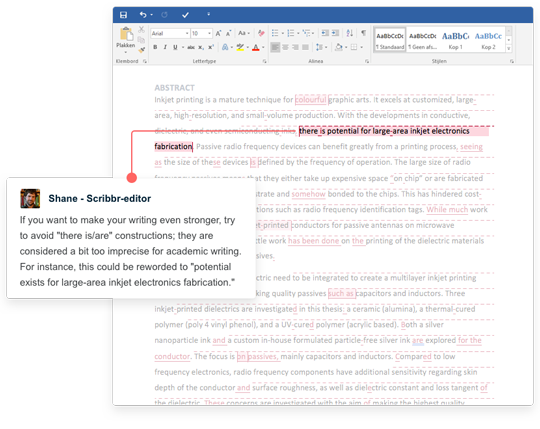
Personal Statement Editing
Scribbr editors correct spelling, grammar, and punctuation errors using track changes, but that’s not all. To take your personal statement to the next level, they also give feedback and ensure
- Clear sentence structure
- Concise, coherent phrasing
- Consistent tone and style
- and more…
Rest assured, we make sure your voice remains dominant throughout your personal statement.
Get matched to the perfect editor
At Scribbr, you can rest assured that only the best editors will work on your personal statement.
All our 800+ editors have passed the challenging Scribbr Academy, which has a passing rate of only 2%.
We handpick your editor on several criteria, including field of study.
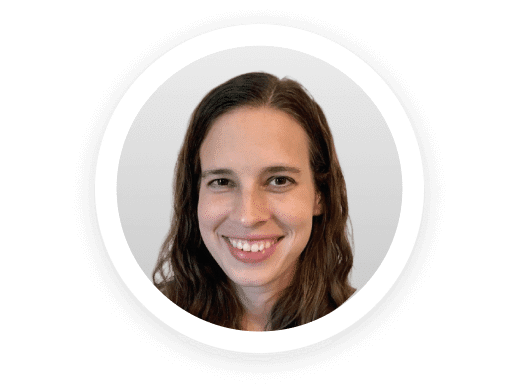
Janice holds a PhD in German studies from Duke University. As a former professor, she has helped many students refine their application essays for competitive degree programs and study-abroad programs.

Alexandra earned an Erasmus Mundus MA in cultural narratives and a BA in English from Emory University. As a teacher, editor, and writing coach, she has spent nearly a decade helping students find their voice and express their ideas.
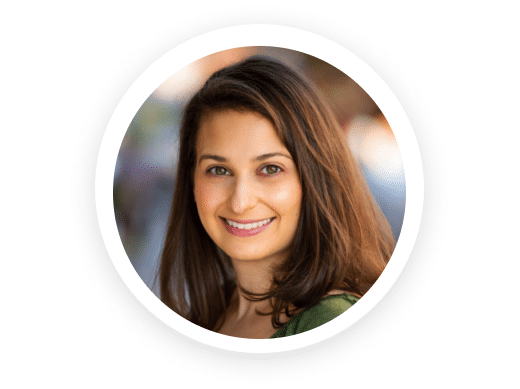
Originally from Maryland, Amy headed west to attend Scripps College in California, where she earned a bachelor's degree in music and gender studies. In 2009, she began working for the admissions office of her alma mater, where she focused on reviewing applications and interviewing prospective students.

For the Personal Statement Editing & Coaching service, you’ll be matched with a personal statement editor, who will review your draft and help you strengthen your writing.
You’ll receive…
- A professionally edited personal statement
- Advice on how to tell a clear and compelling story
- Assurance that you’ve made a strong case for your admission
- Suggestions to help you meet your word count
You can receive your feedback in as little as 12 hours or less. Get peace of mind knowing your personal statement is the best it can be, and boost your chances of getting accepted at your top schools.
“Thank you for editing my personal…”
Thank you for editing my personal statement. Your service is always great. I recommend you to my friends.👌👌👌
How it works
Stay in control throughout the editing process, upload your draft.
Send us your draft. Share important information, including your prompt and any questions you have for your editor.
Feedback from an expert
Your editor reviews your work. You’ll receive a polished personal statement along with in-depth content advice.
Apply with confidence
The application process can be stressful, but with the help of your personal statement editor, you can apply with confidence.
Scribbr & academic integrity
Scribbr is committed to protecting academic integrity. Our proofreading service, our AI writing tools ( plagiarism checker , paraphrasing tool , grammar checker , summarizer, Citation Generator ) as well as our free Knowledge Base content are designed to help students produce quality academic papers.
We make every effort to prevent our software from being used for fraudulent or manipulative purposes.
Your questions, answered.
Yes! Our personal statement editors can help you reduce your word count by up to 25%. You can choose to receive this feedback through direct edits or suggestions in comments – just select your choice when you upload your personal statement.
At Scribbr, we promise to make every customer 100% happy with the service we offer. Our philosophy: Your complaint is always justified – no denial, no doubts.
Our customer support team is here to find the solution that helps you the most, whether that’s a free new edit or a refund for the service.
Get in touch, with real people
We answer your questions quickly and personally from 9:00 to 23:00 CET

- Start live chat
- Email [email protected]
- Call +1 (510) 822-8066
- WhatsApp +31 20 261 6040
Knowledge Base
Finish your personal statement with scribbr’s top-rated guides.
Personal Statement
How to Write Your Personal Statement
How to write a statement of purpose, how to apply for graduate school, how to write a college essay.
The Ultimate Guide to Writing an Outstanding Law School Personal Statement
Dazzle admissions with your legally awesome personal story, introduction.
Let's face it: you've spent countless hours studying and acing the LSAT, and now it's time for the pièce de résistance – the law school personal statement. This is your golden opportunity to showcase your personality, and put your best legal foot forward. But don't worry, this guide has got you covered. In no time, you'll be writing a personal statement that could put John Grisham's early drafts to shame.
If you're ready to convince law school admissions committees that you're the next Ruth Bader Ginsburg or Thurgood Marshall, then buckle up and get ready for a wild ride through the world of crafting the ultimate law school personal statement.
1. Know Your Audience: The Admissions Committee
First and foremost, remember that you're writing for the admissions committee. These are the gatekeepers of your future legal career, and they've read more personal statements than there are citations in a Supreme Court decision. To avoid becoming a legal footnote in their memory, keep the following in mind:
- Be professional, but also relatable. You don't want to sound like a robot that's been programmed to spout legalese.
- Avoid clichés like "I want to make a difference" or "I've always wanted to be a lawyer." Unless, of course, you've been dreaming of billable hours since you were in diapers.
- Consider what makes you unique. Remember, this is your chance to stand out among a sea of applicants with equally impressive academic records and LSAT scores.
2. Choosing Your Topic: Make It Personal and Memorable
When it comes to choosing a topic for your personal statement, think of it as an episode of Law & Order: Your Life Edition. It's your moment to shine, so pick a story that showcases your passion, resilience, or commitment to justice. Consider these tips:
- Use an anecdote. Admissions committees love a good story, especially one that shows your problem-solving skills or ability to navigate tricky situations. Just be sure not to end up on the wrong side of the law!
- Reflect on a transformative experience. If you've had a life-changing event that led you to pursue law, share it! Just remember to keep it PG-rated.
- Discuss a personal challenge you've overcome. Nothing says "I'm ready for law school" like demonstrating your resilience in the face of adversity.
3. Structure and Organization: Your Legal Blueprint
Now that you've chosen your topic, it's time to draft your personal statement. Like a well-organized legal brief, your statement should have a clear beginning, middle, and end. Consider the following tips for structuring your masterpiece:
- Begin with a strong opening. Start with a hook that will capture the reader's attention and make them want to keep reading. Think of it as your own personal Miranda warning: "You have the right to remain captivated."
- Develop your story in the body. This is where you'll expand on your anecdote or experience, and explain how it has shaped your desire to pursue a legal career. Remember to be concise and avoid meandering – this isn't a filibuster.
- End with a powerful conclusion. Tie everything together and reiterate why you're the ideal candidate for law school. Just like a closing argument, leave the admissions committee convinced that you're the right choice.
4. Style and Tone: Finding Your Inner Legal Wordsmith
When it comes to your personal statement, you want to strike the perfect balance between professional and engaging. After all, no one wants to read a 500-word legal treatise on why you should be admitted to law school. To achieve this delicate balance, follow these style and tone guidelines:
- Write in the first person. This is your personal statement, so own it! Using "I" allows you to convey your unique perspective and voice.
- Keep it conversational, yet polished. Write as if you were speaking to a respected mentor or professor. Avoid slang, but don't be afraid to inject a bit of your personality into your writing.
- Employ dry humor sparingly. A little wit can make your statement more enjoyable to read, but remember that humor is subjective. It's best to err on the side of caution, lest you inadvertently offend the admissions committee.
- Be precise and concise. Legal writing is known for its clarity and brevity, so practice these skills in your personal statement. Aim to keep it between 500 and 700 words, as brevity is the soul of wit (and law school applications).
5. Revision: The Art of Legal Editing
It's been said that writing is rewriting, and this is particularly true for your personal statement. Once you've drafted your masterpiece, it's time to don your editor's hat and polish it to perfection. Follow these tips for a meticulous revision:
- Take a break before revising. Give yourself some distance from your statement before diving into revisions. This will help you approach it with fresh eyes and a clear mind.
- Read your statement out loud. This technique can help you catch awkward phrasing, run-on sentences, and other errors that might not be apparent when reading silently.
- Seek feedback from others. Share your statement with trusted friends, family members, or mentors who can provide constructive criticism. Just remember, opinions are like law school casebooks – everyone's got one, but you don't have to take them all to heart.
- Edit ruthlessly. Don't be afraid to cut, rewrite, or reorganize your statement. Your goal is to make your writing as strong and effective as possible, even if it means sacrificing a clever turn of phrase or an endearing anecdote.
6. Proofread: The Final Verdict
Before submitting your personal statement, it's crucial to proofread it thoroughly. Even the most compelling story can be marred by typos, grammatical errors, or other mistakes. Follow these proofreading tips to ensure your statement is error-free:
- Use spell check, but don't rely on it entirely. Some errors, like homophones or subject-verb agreement issues, may slip past your computer's watchful eye.
- Print your statement and read it on paper. This can help you spot errors that you might have missed on-screen.
- Enlist a second pair of eyes. Sometimes, a fresh perspective can catch mistakes that you've become blind to after multiple revisions.
Crafting an outstanding law school personal statement may seem daunting, but with the right approach and a healthy dose of perseverance, you can create a compelling and memorable statement that will impress even the most discerning admissions committee. So go forth and conquer, future legal eagles! And remember, as you embark on your law school journey, may the precedent be ever in your favor.
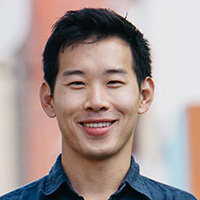
Tech-focused creator of LSD.Law. I built LSD while applying to law school. I saw unequal access to knowledge and built LSD to level the playing field and help applicants make thoughtful, well-informed decisions in the application process.

- Data download
Help us make LSD better!

Which program are you applying to?
Law school personal statement services.
- Consulting & Editing
- Personal Statement Editing
Hourly Personal Statement Plans
If you don't need comprehensive, start-to-finish personal statement assistance, but need help perfecting a draft you already have, then we recommend our hourly plans. This way, you only pay for what you need.
Here’s how it works:
- Presented yourself distinctively.
- Organized your personal statement(and supplemental essays) logically.
- Developed engaging openings and effective conclusions.
- Edit the micro. After your consultant checks the macro level, she focuses this time on the micro, specifically clarity, grammar, style, spelling, and word usage. She then sends you drafts with suggested corrections.
- Submit your awesome personal statements!
How much to buy? That depends on the number of drafts as well as the quality of your writing. You can either obtain a free estimate before purchasing or use the estimate guidelines to purchase and proceed ASAP.
How Many Hours Do I Need?
You can use the time you purchase for any hourly Accepted service including interview coaching and resume editing.
Choose How Many Hours You Want to Start:
Our rates provide prompt two-business-day turnaround.
Minimum purchase required
Existing clients only
Starting at $30 /mo with Affirm .
Have a question?
Not sure how much time you need, we offer complete application packages too, boring but important stuff.
- All rates are expressed and billed in U.S. dollars.
- Our regular rates provide two-business-day turnaround for each round of editing.
- Services are subject to availability.
- All prices are subject to change without notice.
Initial Personal Statement Package
With the Personal Statement Package, you’ll receive:
- Up-front guidance and advising to save you “churn time.” You introduce yourself to your consultant via a questionnaire. After reviewing the questionnaire, your consultant meets with you on the phone or Skype to get to know you better and discuss the best way to present you and your qualifications in your personal statement. During this brainstorming session, you will discuss a core idea, seminal experiences to include in the personal statement, and a structure for the personal statement.
- An outline for your personal statement based on your responses in the questionnaire and the brainstorming session. The outline consists of prompts and bullet points. It is NOT a draft. Clients say that the conversation and the outline give them the direction they need to write, save time, and ultimately help them produce a superior final result.
- Personal Statement editing. Your consultant checks your personal statement for clarity, grammar, style, spelling, and word usage. She then sends you drafts with suggested corrections. You revise it and send it back. You then go back and forth editing and revising this personal statement until you are happy with it. Most personal statements benefit from 2-4 reviews.
The Personal Statement Package will give you the confidence of knowing you are submitting an awesome personal statement.
Starting at $ 107 /mo with Affirm .
Our regular rates provide prompt two-business-day turnaround.
Additional Personal Statement Package
Since your consultant already knows you well and any brainstorming will take less time, Additional Personal Statement Packages are less expensive than the Initial Personal Statement Package.
Starting at $80 /mo with Affirm .
- One Personal Statement Package provides all the editing and consulting you need for ONE essay at ONE school. Using our assistance in modifying this essay for other schools will incur additional charges.
- The Additional Personal Statement Package is available for any essay assistance you purchase after an Initial Personal Statement Package. It cannot be used for your first essay.
- Packages must be entirely used in one application year.
Not sure if a package is right for you?
- Translators
- Graphic Designers
- Editing Services
- Academic Editing Services
- Admissions Editing Services
- Admissions Essay Editing Services
- AI Content Editing Services
- APA Style Editing Services
- Application Essay Editing Services
- Book Editing Services
- Business Editing Services
- Capstone Paper Editing Services
- Children's Book Editing Services
- College Application Editing Services
- College Essay Editing Services
- Copy Editing Services
- Developmental Editing Services
- Dissertation Editing Services
- eBook Editing Services
- English Editing Services
- Horror Story Editing Services
- Legal Editing Services
- Line Editing Services
- Manuscript Editing Services
- MLA Style Editing Services
- Novel Editing Services
- Paper Editing Services
- Personal Statement Editing Services
- Research Paper Editing Services
- Résumé Editing Services
- Scientific Editing Services
- Short Story Editing Services
- Statement of Purpose Editing Services
- Substantive Editing Services
- Thesis Editing Services
Proofreading
- Proofreading Services
- Admissions Essay Proofreading Services
- Children's Book Proofreading Services
- Legal Proofreading Services
- Novel Proofreading Services
- Personal Statement Proofreading Services
- Research Proposal Proofreading Services
- Statement of Purpose Proofreading Services
Translation
- Translation Services
Graphic Design
- Graphic Design Services
- Dungeons & Dragons Design Services
- Sticker Design Services
- Writing Services
Please enter the email address you used for your account. Your sign in information will be sent to your email address after it has been verified.
Our Top 12 Personal Statement Editing Service Professionals
With our editing, your personal statement will make the right impression.
An expert's outside perspective is essential for shaping your personal statement into exactly what colleges and universities want to see. The dedicated editors at ServiceScape know this, and they can focus your writing on what matters most: delivering a message that's clear, precise, and to the point.
Proudly Trusted By:

12. Keith2314
103 Client Reviews 2,991 Pages Edited
M.A. in Linguistics from Northeastern Illinois University
What We Bring to the Table
ServiceScape is built on 24 years worth of experience, working on over 340,000 projects with over 98,000 clients. Join the thousands of people who have chosen ServiceScape to find the best and brightest talent.

Make your personal statement shine
Applying to an undergraduate school, medical residency, fellowship, law, master's, Ph.D., or other program is an exciting but challenging task. One of the most important steps in this process is writing a personal statement that conveys your character and capabilities. What qualifications and achievements separate you from the rest? What drives your passion for your academic field? What motivates you to pursue your goals? This is your chance to clearly communicate who you are and why you should be accepted.

An inspired and well-written personal statement can put you at a substantial advantage and make you stand out from the competition. That's why it is vital to reach out through your writing, to justify your potential and show the admissions officers that you are more than just a GPA and test scores.
You should never be on your own when it comes to such an important part of your admissions package. That's where we come in.
We are your personal statement editing experts

ServiceScape can elevate your personal statement from good to extraordinary, helping you find exactly the right words to present yourself just as you want the admissions officers to see you. When you are ready to join the thousands of clients who have trusted us to improve their personal statements, our experts will be here to help make your writing stand out from the crowd.
Our professional editors will go over your personal statement with the proverbial fine-tooth comb, evaluating and addressing:
- Errors in spelling, grammar, syntax, tense, and sentence structure
- Readability and flow
- Overall organization
- How well the statement responds to any required prompt
- The strength of your introduction and conclusion
- Redundancy and unnecessary content
- Conciseness and adherence to any required word count, where possible
- Language and diction
- Consistency in regional English spelling conventions, including American, British, Canadian, and Australian variations
- Your overall writing style
We'll fix any and all issues with your personal statement, removing or improving anything that admissions officers are tired of reading. When we have finished perfecting your work, your personal statement will keep your readers focused and eager to read on. Reader engagement is what we are all about!
What our editors will do for you

Our editors won't be finished with your project until you're thrilled with a final product that you can be proud to submit in your application.
Need to brainstorm with your editor and have an ongoing dialogue about your personal statement? We believe in maintaining open communication from start to finish. With ServiceScape, you can discuss any issue with any editor at any time, either by exchanging messages or by setting up a teleconference call. With open communication with your editor of choice, we guarantee that you and your personal statement editor will always be on the same page.
Need your personal statement delivered earlier? No problem. If you need it within an hour, we'll be more than happy to oblige. Just submit an Express Delivery project, and your chosen editor will quickly enhance your writing without any compromise on quality.
When working with ServiceScape, we guarantee that you will be completely satisfied. Your personal statement is an important part of your future, and that's why we're passionate about making it the best that it can be. It's also important to how you represent yourself, and that’s why we take great care to maintain your unique personality and voice.
The results speak for themselves, with thousands of positive ratings and reviews from clients just like you. If you’re ready to become our next satisfied client, just start browsing our directory of experienced editors. When you find the right person for your personal statement, we’ll get straight to work!
Frequently asked questions
You can hire an editor in just four steps:
- Browse our directory to find the editor you want to hire.
- Click the "View Profile" button to see additional information.
- From the profile page, click on the "Hire Me" button.
- Upload your writing and enter your project details.
You will have the option to either select a predefined service or create a custom project. If you select a predefined service, you can pay for your project immediately by using a credit card, U.S. bank transfer, or PayPal®. After your payment method has been approved, the editor will start working on the project as soon as possible and will deliver it by the due date you selected. If you select a custom project, the editor will provide you with a service proposal that will have a unique price for the unique service you require.
Sure! Many ServiceScape editors provide free samples. You can submit a free sample request by doing the following:
- Browse our directory to find an editor you'd like to ask for a free sample.
- From the profile page, click on the "Free Sample" button.
If the editor accepts your free sample request, you will receive the sample edited version within a couple of days.
To contact an editor about your project, just do the following:
- Browse our directory to find the editor you'd like to contact.
- From the profile page, click on the "Send Message" button.
- Write and send your message.
We will email you a notification as soon as your editor replies to your message.
If you would like to speak with an editor directly, just do the following:
- Browse our directory to find an editor you'd like to speak with on a teleconference call.
- From the profile page, click on the "Teleconference" button.
- Enter the date and time you would like to have your discussion.
We will contact you right away about availability and set up the teleconference for all parties involved.
You can find ratings and reviews from past clients within most editor profiles. Just find your editor and click on the "View Profile" button to see them. You can also read ServiceScape ratings and reviews on eKomi . In addition, ServiceScape has been featured in several publications and websites, including The Wall Street Journal , Los Angeles Times , UpWork , HuffPost , Indeed , and The Ladders .
Many editors have portfolios which feature their editing. Just find your editor and click on the "View Profile" button to view these edited versions.
A list of prices and due dates can be found within each editor's profile. Just find your editor and click on the "View Profile" button.
Yes, we provide editing certifications. Simply request the document when you hire an editor. When your project is delivered, you can download the editing certification by clicking on your project and clicking on the "Certification" button. These signed declarations certify that a document has been professionally edited by a ServiceScape editor.
Are you ready for the right personal statement editor, right now?
Browse rated and reviewed professionals today.
Add Project Key Words

Everything You Need to Know About the Law School Personal Statement
Padya Paramita
February 10, 2021
Law school admissions committees can see your numbers and extracurricular activities on paper, but have absolutely no idea about who you are as a person and what makes you unique. This is where your personal statement comes in. Your law school personal statement is the place to reflect on your interests and background to help set you apart from the rest of the candidates in a tough law school application pool.
While you may have similar grades, extracurriculars, and LSAT score as the other applicants, your law school personal statement should stand out as your chance to show JD programs your unique story. Take this opportunity to discuss your interests, your travels, or how your cultural identity made you the person who should be admitted. A strong personal statement combines a carefully chosen topic with well-crafted prose.
You might have guessed by now that writing your law school personal statement isn’t something you should take for granted. This essay can make a difference even if your GPA and LSAT score aren’t quite up to the mark. To help you understand the process more clearly, we will take a closer look at the law school personal statement prompts from the T-14 schools, talk more in detail about the importance of your personal statement, go over how to pick the right topic, discuss common mistakes people make when writing, as well as review tips for editing your personal statement before submitting your law school application.
Requirements from School to School
It wouldn’t be the wisest decision to submit the same personal statement to all law schools because they’re not identical at all! When you apply to law schools via the Law School Admission Council (LSAC), each school has its own personal statement requirements and prompt. The word or page limit varies from school to school as well - it’s usually somewhere between two and three pages. So, writing one essay to send to every school won’t suffice.
While you can write a barebones essay on one topic to serve as a skeleton, make sure to tweak and expand on it to suit each school’s specific question. Some of the prompts are more open-ended than others. All of them want to know you better, understand your personality, and see context and color within your law school application. Outlined below are the law school personal statement prompts for each of the T-14 schools.
Most of these prompts are open-ended, except the one for Duke. Duke’s personal statement has two requirements. First, that you reflect on opportunities you’ve pursued that aren’t mentioned in your resumé, and second, that you discuss your personal career ambitions.
While the others may be broad, some prompts encourage you to choose specific routes when considering your topic. For example, UChicago emphasizes that you should not reiterate your resumé, and your essay should be about something not already covered. On the other hand, Columbia wants to know by the end of the essay why you’re interested in going to law school - specifically to Columbia. Similarly, the UPenn admissions committee also wants to know why you’ve decided to pursue a JD, and how UPenn will help you. For the UC Berkeley essay, you are encouraged to discuss any diversity factors - whether in your interests or your background. Northwestern recommends that you reflect on your personal and professional goals.
As you can see, while one draft reflecting on a particular interest or story could respond to most of these law school personal statement prompts, you cannot - and should not - submit the same essay for all law schools. Make sure your essay is geared toward answering the question each institution asks. Mention the school specifically as well, if applicable.
The Importance of the Personal Statement in Your Application
You’re going to have to write - all the time - while you’re in law school. Your personal statement gives law school admissions committees an idea of your writing style and how you would fare in a writing-intensive curriculum. Like we’ve mentioned, the law school personal statement presents an opportunity for the program to get to know you better, and learn something about you that is not apparent from your transcript or resumé. It’s crucial that you highlight a story that is your own - not your parents’ or your friends’ - and one which helps admissions committees understand you beyond your LSAT score and your professional experience.
If your GPA or your LSAT score aren’t up to par with the school’s median, a strong personal statement can combat the weaknesses in your application. Remember: your personal statement is not the place for you to explain why you have shortcomings in your application. Rather, if your topic and writing are stellar enough, admissions committees might overlook the lower numbers.
There is no typical law student. Law schools don’t want their classes to be full of the same type of applicants. The personal statement helps law schools determine how diverse, in terms of race, gender, sexuality, class, and professional and extracurricular background an incoming class will be. So your personal statement is crucial in helping admissions committee members understand who you are, what you value personally and professionally, and where you come from.
Picking Your Topic
It might feel like a lot of pressure to find the perfect topic. How do you know what will set you apart? Which part of your identity do you talk about? Or, should you talk about your extracurriculars instead? The perfect topic won’t come to you immediately. Look at the prompts for the schools that interest you, and then try asking yourself a few questions. This can get you a handful of ideas that might be worth expanding upon.
Some questions you could ask yourself are:
- How has your upbringing shaped you? Has your geographical or cultural background made an integral contribution to the way you think or the career path you’ve chosen?
- What is the most unique or unusual thing about your family?
- Do you have any hobbies that most people don’t? What have they taught you?
- What has been your proudest non-academic achievement?
- Where do you excel?
- What is your dream career?
- What kind of law do you wish to pursue?
- What current issues are you most passionate about?
- If you weren’t going to law school, what would you be doing?
- When did you first know you wanted to become a lawyer?
- How did your extracurriculars shape your decision to apply to law school?
- What kind of jobs have you worked? Which has been the most memorable or meaningful?
- Did a significant event impact your decision to become a lawyer?
- What has been the greatest challenge you’ve faced?
When brainstorming topics, take a trip down memory lane. Think about your childhood, your interests, your goals, and your background. Jot down events and parts of your life that stand out - topics don’t always have to be about your culture or background. Something that might feel minute like your coin collection or your backpacking trip during a gap year can spark some inspiration. Once you’ve picked a few topics that bring out your best storytelling and writing skills, go ahead and write a first draft. Remember to show not tell!
Mistakes to Avoid
Rewriting your resumé: We cannot emphasize this enough: do not repeat the information on your transcript and resumé. They exist as separate components for a reason.
Writing about someone else: Never fall into the trap of writing about someone else. Sure, you could dedicate a sentence or two to someone who inspired you, but your own personal story should be at the core of the essay.
Straying away from the prompt : The schools have a set of questions for a reason. If Duke asks you to talk about your career ambitions , don’t go off on a tangent about what you’ve done in the past. You have limited space. Don’t waste it.
Using pretentious language: Don’t sound like a robot ! It’s your personal statement, and you undoubtedly want your personality to shine through in your writing. Don’t use too many long words that may not fit with the rest of your essay, or might not reflect your usual writing style. Taking a dictionary and throwing every other long word you find won’t help show who you are - you’re not a poet or an SAT tutor, you’re trying to get into law school! Flowery language can make you sound ingenuine.
Trying to finish too fast: Don’t rush through and then skip the time to revise. The last thing you want is to turn in your first draft! There’s always room for editing. Errors can be easily avoided through some careful proofreading. Of course, make sure your spelling and grammar are all correct.
Exaggerating adversity: The applicant pool contains people who have experienced abuse, homelessness, natural disasters, and serious losses. If your adversity is not as grave in comparison to these powerful stories, don’t write about adversity. If you suffered from chicken pox, there’s no need to write lines and lines about the pain you experienced. Or if your friend was bullied in high school and you were simply a witness, you should not be writing about all the torment you suffered and how you grew from the experience!
Discussing academic inconsistencies: Your law school personal statement is NOT the place where you talk about why your junior spring grades fell drastically due to an emergency. Law schools usually have an addendum section for cases such as this. Don’t waste your page limit focusing on bad grades when you can be writing a glowing, positive essay instead!
Living in the past: You’re an adult now. There’s no way your biggest accomplishment to date is an award you won in high school. You’ve been through at least four years of college since, seen more places, met more people, and gained much greater knowledge and experiences. Your character has grown a lot, and law school admissions officers want to see that. Don’t write about your love for your high school debate club or how you led your high school Model UN team to multiple championships.
Mixing up schools: Don’t send the wrong letter to the wrong school. Your Harvard Law essay cannot have the word “Yale” all over, or in fact anywhere. Make sure you’ve checked and double checked that you’re sending the essays to the right school, and maintained each of their word or page limits.
Editing Your Personal Statement
Once you’ve got that first draft out of your system, it’s time to edit and polish your work. It wouldn’t hurt to take a couple days away from your essay, and then come back and review it again. Read it out loud. That way, you can spot errors or sentences that don’t flow as well as you might have thought they did the first time around. Have a parent, friend, or coworker read it. Another set of eyes and opinions is a great way to improve and catch silly errors.
When checking for typos, don’t rely on spell checkers. They don’t always catch similar-sounding words, such as where vs. were. Make sure your sentences aren’t too long. Transitions between paragraphs should also be smooth. Remember, the quality of your writing will be evaluated alongside the content of your personal statement. Check back with the prompt to ensure that you’ve answered what they’ve asked, and not gone off on a completely separate tangent. The editing process is just as important as the writing, and taking the time to sit down and go through multiple drafts goes a long way toward helping your personal statement stand out.
Your law school personal statement is your chance to showcase your individuality and provide more information on how your upbringing, activities, and interests can not only contribute to an esteemed law school, but also make a difference in the world after you graduate. No matter what you decide to write about, use your personal statement as a chance to go beyond your grades and work experience. Let the admissions committee get to know what makes you tick, and help them realize why you would be a wonderful asset to their institution.
Tags : applying to law school , law school personal statement , law school essay , law school essay prompts , jd essay prompts
Schedule a free consultation
to find out how we can help you get accepted.
Personal Statement Editing Service: Elevate Your Story Fast, Affordable, Professional
Personal statement editing transforms your personal statement into a compelling narrative. Use this service to ensure that your personal statement reflects your unique qualities and aspirations. Let us help you stand out with a polished, persuasive personal statement.
Try before you buy.
Get an instant quote. Services are available 24/7.
- Personal Statement Editing Service: Elevate Your Story
Expert Personal Statement Editing Service
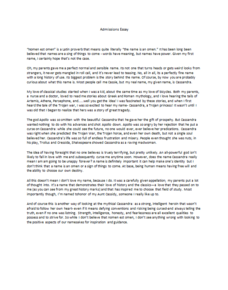
Your personal statement is a pivotal component of your college or graduate school application. It's your opportunity to make a compelling case for admission by showcasing your unique skills, experiences, and aspirations. However, crafting a standout personal statement essay requires time and skill. That's where our Personal Statement Editing service can help.
At Scribendi, we understand the significance of a well-written personal statement. Our team of experienced editors is dedicated to enhancing your writing and ensuring that your personal statement is error-free, clear, and impactful. Get more than just grammar and punctuation; get Structural Editing and constructive feedback to strengthen your content. Let's craft a college admissions or graduate school application that will help you shine.
Our editors are well-versed in what admissions committees and officers seek in a personal statement. They can help you avoid common pitfalls and guide you in effectively communicating your skills and aspirations. Don't let the pressure of writing a personal statement hold you back! Our editing service is here to help you present the best version of yourself to the admissions committee. Whether you need personal statement proofreading or a comprehensive editing service, we're your partner in this crucial phase of your academic journey.
Need Personal Statement Editing?
Your personal statement is your voice in the competitive world of college admissions and graduate school applications. Crafting a compelling and error-free personal statement essay is essential to make a lasting impression. If you find yourself struggling to perfect your statement, our Personal Statement Editing service is here to provide expert assistance .
We recognize the significance of a well-polished personal statement. Our experienced editors are dedicated to helping you achieve the best possible version of your essay. Whether you need assistance with personal statement proofreading or comprehensive personal statement editing , our team is here to ensure your writing is clear, coherent, and impactful.
We understand that the college admissions and graduate school admissions committees are looking for more than just good grammar. They want to get to know you through your writing and understand your unique skills and aspirations. Don't let the pressure of creating a perfect personal statement overwhelm you. Trust our editing service to guide you toward presenting your best self to the admissions officers. Try personal statement editing to take the first step toward success in your academic journey.
What will you receive with Personal Statement Editing?
- An edited document in which misspellings, grammar errors, and typos have been corrected
- Changes and suggestions to help improve clarity, flow, structure, and readability
- Tracked revisions so that you can see and review all the changes that have been made
- In-depth critical commentary on your personal statement
- A short summary of the work that has been done and any major concerns
What types of documents can you use Personal Statement Editing for?
- Personal statements
- Other admissions documents
Rest assured, whether you're entrusting your confidential personal statement or engaging our expertise in personal statement editing services, your document's privacy is our top concern. We uphold the strictest confidentiality for your work.
All uploads and downloads to our secure server are encrypted , and our robust privacy policies are in place to protect your personal statement, academic research, and personal data. Assistance for your personal statement editing needs is just a click away.
We are dedicated to ensuring the highest level of security and quality for your academic work. Get an instant quote for your personal statement editing below and place your order now .
Get an Instant Quote and Place Your Order
Personal statement editing services faq, what do i write in a personal statement.
When it comes to the question of what to write in a personal statement for college or graduate school admissions, personal statement editing can help you craft a compelling essay. A personal statement is a critical component of your college or university application. You should write about your personal experiences, skills, and aspirations. Don't simply list achievements; provide real examples that show who you are and why you're an ideal fit. Personal statement editing services can be of great help in refining your statement, making sure it stands out to admissions committees. Take your time to write a personal statement that truly reflects your unique qualities and ambitions, and seek professional assistance when needed.

How do I start my personal statement?
When beginning your personal statement for college or graduate school admissions, personal statement editing can provide invaluable guidance. To start, focus on a compelling opening that grabs the admissions committee's attention. Share a personal anecdote, relevant skill, or life experience that connects to your educational and career goals. Show, don't just tell, who you are through vivid examples. Personal statement editing services can help refine and structure your introduction, ensuring that it makes a memorable impression on admissions officers. Don't rush the process; take the time to craft an engaging and authentic personal statement.
Why does my personal statement need editing?
Personal statement editing is essential because it can significantly enhance the quality and impact of your personal statement. A well-crafted personal statement can make a difference in college or graduate school admissions. Editing refines your essay, helping you avoid common pitfalls and ensuring your writing is clear, concise, and error-free. It helps you communicate your skills, experiences, and aspirations effectively, making your personal statement more appealing to admissions committees. Experienced editors can provide constructive feedback and suggestions, ultimately helping you create a personal statement that stands out and resonates with admissions officers.
What are the advantages of hiring an editor to revise my personal statement?
Opting for personal statement editing services offers several advantages in crafting a compelling personal statement. Editors bring a trained eye to your essay, ensuring it's clear, well-structured, and free of errors. They can help you avoid common pitfalls, making your personal statement more effective at capturing admissions committees' attention. With their expertise, editors also provide valuable feedback on your content and writing style, helping you convey your skills, experiences, and aspirations more persuasively.
This assistance can be especially crucial when you're short on time or feel unsure about how to write a personal statement that resonates with admissions officers. Overall, hiring an editor empowers you to submit a polished and memorable personal statement that bolsters your college or graduate school application.
How to Format Your Law School Personal Statement

How do you write your law school personal statement? Well first of all, let’s make sure that we’re on the same page about what your personal statement is. Your personal statement is the one part of your law school application package and law school requirements that you have complete control over, so you’ll want to put your best foot forward. A personal statement will often focus on why you want to go to law school (or transfer law schools ), but it can also focus on a personal story or aspect of your life.
It shows what makes you unique and why a school should admit you. The personal statement should focus on you, your background, and your goals more broadly. Make sure that it adds something new to your application materials – the school already has your transcript, resume, etc. Think about what you really want the application committee to know about you.
Before anything else, a quick clarification: the law school personal statement is different from an optional essay , which can take on a variety of forms. This could include diversity statements, addendums, or other essays. Here are some examples of law school personal statements that may help you understand the task at hand better.
How do you format a law school personal statement?
In brief, here’s what your law school personal statement will need in terms of format:
- Overall : No title, 11- or 12-point Times New Roman font, one-inch margins.
- Header : Your name, your LSAC number, and “Personal Statement” with a page number, formatted as either one or three lines. Check with your school’s requirements.
- Body : Double-spaced, left-aligned (or justified), paragraphs indented 0.5 inches and not separated with an extra line, single space after periods.
- Ending : End as you would a normal essay. This isn’t a letter; no signature is needed.
Personal Statement Header
The header of the personal statement deserves a closer look. There are two ways of formatting this: either on one line, or on three. One line gives you more space on the page, but can look busy. Three lines have the opposite effect. Weigh the pros and cons based on the length of your statement, then format accordingly.
If you choose the one-line format, be sure to space your information out equally or separate it with punctuation (commas, dashes, and slashes work well) so that it reads clearly.
If you use a three-line format, separate information by line like this:
Name, Page Number LSAC # Personal Statement
Law School Personal Statement Format: FAQs
What should be included in a law school personal statement.
- Who you are. Show readers that you’re an interesting person who brings experiences and skills that will benefit not only the campus community, but the larger legal community.You’re applying in a pool of thousands of candidates, so be sure to highlight what makes you stand out from your peers.
- Your true voice. There’s a reason why the personal statement isn’t just called a statement or an essay. Sometimes applicants feel that they should write pieces about public policy or social issues, but these too often fall short of showing an applicant’s true voice. Have someone you know well review your personal statement objectively. If they can’t tell you were the one who wrote it, it’s probably time for a rewrite .
- Specific information about that school. It’s not sufficient to say that you want to attend Santa Clara Law School for its good curriculum, strong faculty, and numerous clinic opportunities. Notice how you could replace “Santa Clara Law School” with any other law school’s name, and the sentence could still make sense? That tells Santa Clara admissions officers that you don’t know very much about their school. Which leads us to our next point…
- Research on the school itself. Figure out what makes the schools you’re applying to different from others. This is a great opportunity to reach out to alumni, and talk to the admissions staff! You can also use the Internet, visit your local bookstore and check out some guide books, or search around on online forums. Some schools are known for their strength in a certain area of law (think international law or intellectual property law ). Some schools are known for their commitment to pro bono work . Some schools’ faculty are renowned for their research in a specific discipline. Others offer distinctive programs or fellowships to their students. Identify what really interests you about the school, and tie that back to the academic and career interests you discuss in your personal statement.
- Reflections on the school’s environment. Perhaps you’re looking for a collegial law school environment that mirrors your own undergraduate experience at a small liberal arts school. Or perhaps you’re looking for a large law school so you can take advantage of the network and breadth of resources and alumni that a law school of that size can offer. And don’t forget about the environment outside the school building! Is it important that you have access to hiking trials? Or a ski slope to enjoy over winter break? Environment is often a key factor students consider when deciding on a particular law school, so don’t forget to mention it as a way to express your interest!
- Concise writing. Check your school’s website to determine how long your personal statement can be, and take it seriously. Law schools are not only looking at whether you can write concisely and effectively, but also whether you can follow posted instructions. Most schools only allow 2-5 pages for personal statement submissions. As a lawyer, you’ll need to write briefs and be able to clearly present client cases. Now’s the time to show that you are capable of honing your communication skills.
- Authenticity. Law schools aren’t asking you to establish your own NGO or be an Olympic athlete. Rather, they’re looking for candidates who help round out a class and contribute positively to their school. Plenty of people get admitted to law school each year who aren’t superhuman, so don’t feel a need to pretend you’re more accomplished than you are (or stretch the truth). Be yourself – and view this as part of helping the reader understand who you are.
- Correct writing. Maybe for class assignments, you’ve been able to submit the first draft you write as final. Or maybe one edit is typically sufficient for you to call an essay complete. For the law school personal statement, you want to commit at least two rounds of edits to perfecting your writing. Not only should you review your work, you should also ask both a friend and a fully objective reviewer (like a career center counselor or a campus writing tutor) to give feedback. Once you have at least two rounds of edits, read it out loud to yourself. This will help you identify any awkward phrases and typos. The more time you spend editing your writing, the more confident you’ll be in the strength of your personal statement.
What should you not write in a personal statement for law school?
- Repetition . If your resume shows that you were vice president of your college’s botany club, general secretary of Basket-Weavers Anonymous, and founder of a campus-wide Pizza Appreciation Day, your personal statement need not repeat these things. Now, if founding Pizza Appreciation Day was such a transformative experience for you that you need to highlight it in your personal statement, be sure you’re telling admissions officers something new that your resume doesn’t already tell.
- Your autobiography . Admissions officers don’t need a play-by-play of your entire life’s events from day one. Autobiographies become long and rambling – two things your personal statement shouldn’t be. Focus on aspects of your life that truly differentiate you from others in a meaningful way.
- Academic issues . Law schools offer you space in a separate essay to explain academic discrepancies. Your personal statement is your chance to focus on the positive and show admissions officers you’d be an asset to their school. Don’t use your personal statement to go into detail about how your dog’s unexpected chronic migraines prevented you from getting a good GPA during your first year of college.
- Legal jargon . No, you’re not a lawyer yet – and law school admissions officers are not going to be impressed by legal jargon that’s used incorrectly or used as a way to show off. Keep your tone and language simple. Remember that your personal statement is meant to show your own voice.
- Cliches . Don’t be the student who bores admissions officers with another essay about how you want to be a lawyer because you like to argue. Avoid clichés – by definition, they’re overused and don’t add value. They make your personal statement generic, and you’ll fall flat when compared with other candidates.
- Other people . Your personal statement should keep the focus on you. It’s great if you want to write about how your famous lawyer uncle inspired you to join the legal profession, but make sure the essay remains true to your story – not your uncle’s.
- Slang . Admissions officers view the personal statement as a showcase of your best writing – so slang and casual English are best left behind. While you want your tone to be friendly, you don’t want to sound like you’re chatting with a best friend on a Friday night. Keep things professional.
How do I write a statement for law school?
There are three main steps to the writing process, and they’re no different here! Namely: brainstorm, write, and edit. In this case, though, we’ll add a fourth step: format and proofread.
- Brainstorming is one of the most crucial things you can do for your personal statement. You want to make sure your ideas are strong, following the guidelines above. It can be helpful to spend a little quiet time alone or in a cozy coffee shop to start brainstorming. Check out some of our law school personal statement examples to spark ideas!
- Once you’ve brainstormed and organized your ideas, the writing itself will go pretty quickly. After you’ve written the first draft, leave the personal statement aside for a day or two (a week or more is better!). Then, come back. What parts don’t flow well? What ideas need more (or less) elaboration? Cut—and add—brutally! Editing is not the same as proofreading; this is the point at which you ensure the ideas themselves are sound.
- Now, it’s time for the final line edit-format-proofread. In a line edit, you’ll work to make sure you’re using the best possible words correctly, rephrasing and rewriting as needed. Then, use the law school personal statement format discussed above to organize the writing. Finally, read through for errors in spelling, grammar, and formatting.
Voila! Your law school personal statement is now ready. If you’re planning to send it off to a T14 law school, check out our post on the top law schools for more tips and information. And no matter what, check out our post on how to get into law school !
Need more help?
Improve your LSAT scores with Magoosh LSAT , you can choose between a live cohorted class with an instructor (which includes all our lessons and practice questions) or access to the self-study option by itself.

Rachel is one of Magoosh’s Content Creators. She writes and updates content on our High School and GRE Blogs to ensure students are equipped with the best information during their test prep journey. As a test-prep instructor for more than five years in there different countries, Rachel has helped students around the world prepare for various standardized tests, including the SAT, ACT, TOEFL, GRE, and GMAT, and she is one of the authors of our Magoosh ACT Prep Book . Rachel has a Bachelor of Arts in Comparative Literature from Brown University, an MA in Cinematography from the Université de Paris VII, and a Ph.D. in Film Studies from University College London. For over a decade, Rachel has honed her craft as a fiction and memoir writer and public speaker. Her novel, THE BALLERINAS , is forthcoming in December 2021 from St. Martin’s Press , while her memoir, GRADUATES IN WONDERLAND , co-written with Jessica Pan, was published in 2014 by Penguin Random House. Her work has appeared in over a dozen online and print publications, including Vanity Fair Hollywood. When she isn’t strategically stringing words together at Magoosh, you can find Rachel riding horses or with her nose in a book. Join her on Twitter , Instagram , or Facebook !
View all posts
More from Magoosh
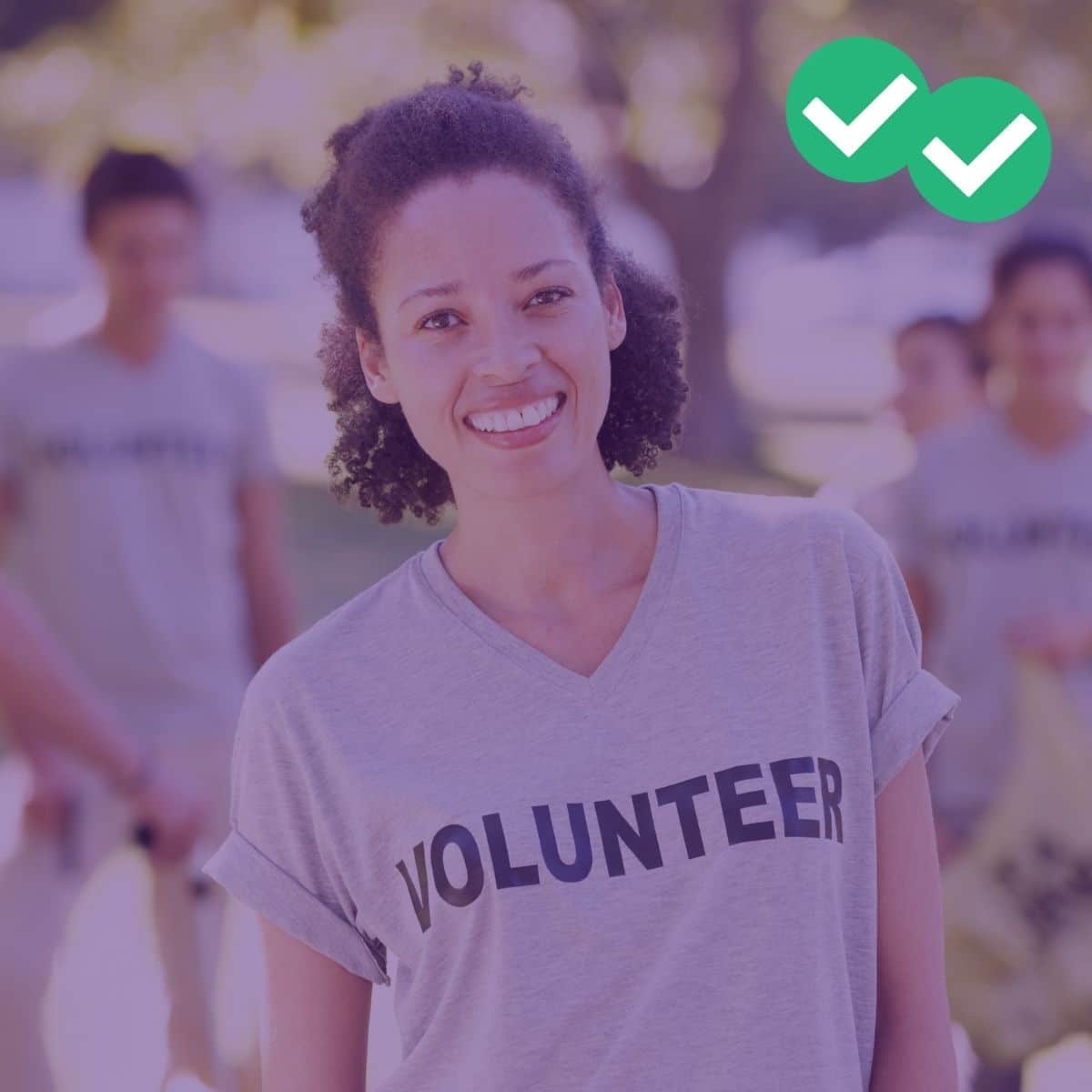
Leave a Reply Cancel reply
Your email address will not be published. Required fields are marked *
18 Law School Personal Statement Examples That Got Accepted!

This blog contains law school personal statement examples written by applicants who were successfully accepted to multiple law schools after working with our admissions experts as part of our application review programs . Your law school personal statement is one of the most important parts of your application and is your best opportunity to show admissions officers who you are behind your numbers and third-party assessments. Because of its importance, many students find the personal statement to be daunting and demanding of the full scope of their skills as writers. Today we're going to review these excellent law school personal statement examples from past successful applicants and provide some proven strategies from a former admissions officer that can help you prepare your own stellar essay.
>> Want us to help you get accepted? Schedule a free strategy call here . <<
Article Contents 44 min read
Law school personal statement example #1.
When I was a child, my neighbors, who had arrived in America from Nepal, often seemed stressed. They argued a lot, struggled for money, and seemed to work all hours of the day. One day, I woke early in the morning to a commotion outside my apartment. Police officers were accompanying my neighbors out of the building. They were being deported. In my teens, I was shocked to see that our kind, friendly neighbors had exhausted their last chance to stay in America as they lost a court appeal.
Since that time, I have worked closely with the many immigrant families in my neighborhood, and now university town. I began by volunteering at a local community center. Together with social workers, I served food and gave out clothes to new arrivals. My diligent work ethic led to more responsibility, and I received training in basic counseling techniques, first aid skills and community services. Soon, I was tasked with welcoming new community members and assessing their health and social needs. I heard the many difficult stories of those who had traveled thousands of miles, often through several countries, risking everything to reach a safe, welcoming country. I was proud to contribute in some small way to making America welcoming for these individuals.
The community center is where I had my first formal contact with legal aid lawyers, who were a constant source of knowledge and support for those who needed assistance. I was struck by the lawyers’ ability to explain complex legal processes to nervous and exhausted incomers: law, I realized, was about more than procedure. I decided that I, too, would strive to balance a wealth of technical knowledge with my caring, compassionate personality.
As soon as I enrolled in university, I knew I had the chance to do so. In my very first week, I signed up to volunteer at the university’s legal aid center, where I worked closely with law professors and students on a range of cases. Academically, I have focused on courses, such as a fourth-year Ethics seminar, that would help me develop rigorous critical reasoning skills. More importantly, I knew that, given my experience, I could be a leader on campus. I decided to found a refugee campaign group, Students4Refugees. Together with a group of volunteers, we campaigned to make our campus a refugee-friendly space. I organized a series of events: international student mixers, an art installation in our student commons, and concerts that raised over $5,000 for the charity Refugee Aid. I am proud to say that my contributions were recognized with a university medal for campus leadership.
I have seen time and again how immigrants to the United States struggle with bureaucracy, with complex legal procedures, and with the demands of living in a foreign and sometimes hostile climate. As I plan to enter law school, I look back to my neighbors’ experiences: they needed someone who knew the law, who could negotiate with the authorities on their behalf, who could inform them of their rights—but they also needed someone who would provide a caring and compassionate outlet for their stresses. I know that Townsville University’s combination of academic rigor, legal aid services, and history of graduates entering labor and non-profit sectors will allow me to develop these skills and continue making contributions to my community by advocating for those in need.
- Thematic consistency: It focuses on just one theme: justice for immigrants. Each paragraph is designed to show off how enthusiastic the student is about this area of law. Personal statements—including those for law school—often begin with a personal anecdote. This one is short, memorable, and relevant. It establishes the overall theme quickly. By constraining their essay’s focus to a single general theme, the writer can go into great depth and weave in emotional and psychological weight through careful and vivid description. The personal statement isn’t a standard 3-paragraph college essay with a spotlight thesis statement, but it conveys similar impact through presenting a central focus organically, without resorting to simply blurting out “the point” of the piece.
- Shows, rather than tells: Connected to this, this statement focuses on showing rather than telling. Rather than simply telling the reader about their commitment to law, the applicant describes specific situations they were involved in that demonstrate their commitment to law. “Show don’t tell” means you want to paint a vivid picture of actions or experiences that demonstrate a given quality or skill, and not simply say "I can do X." Make it an experience for your reader, don't just give them a fact.
- Confident, but not arrogant: Additionally, this personal statement is confident without being boastful—leadership qualities, grades, and an award are all mentioned in context, rather than appearing as a simple list of successes.
- Specific to the school: It ends with a conclusion that alludes to why the applicant is suitable for the specific school to which they’re applying and points to their future career plans. Thoroughly researching the law school to which you’re applying is incredibly important so that you can tailor your remarks to the specific qualities and values they’re looking for. A law essay writing service is really something that can help you integrate this aspect effectively.
What Should a Law School Personal Statement Do?
1. be unique to the school you’re applying to.
Students are always asking how to write a personal statement for law school, particularly one that stands out from all the rest. After all, advice from most universities can often be quite vague. Take this zinger from the University of Chicago : “Write about something personal, relevant, and completely individual to you… Just be yourself.” Every school will have different requirements or content they want to see in a personal statement. This is why it’s a good idea to review specific guidelines for the school to which you’re applying. For example, you can read Yale Law School personal statement examples , Stanford Law personal statement examples , and an NYU personal statement to get an idea of what these schools look for.
2. Demonstrate your skills and capabilities
For motivated students with the world at their fingertips, it’s a tough ask to narrow your character down into a few hundred words! But this is exactly the point of such generic guidelines—to challenge aspiring law students to produce something unique and convincing with minimal direction by the university. Law is, after all, a profession that demands your language to be persuasive, and the personal statement is merely one of many exercises where you can demonstrate your language skills.
3. Meet basic requirements
While the law school personal statement is about far more than just following essay directions, you still need to keep basic formatting and length restrictions in mind. Most law schools ask for a 2-page personal statement, but lengths can range from 2-4 pages. Georgetown Law School , for instance, recommends a 2-page personal statement but explicitly states that there is no official minimum or maximum. In general, length does not make a personal statement better. Rambling, meandering sentences and tiresome descriptions will only hurt the impact of your ideas, especially considering how many thousands of pages admissions committees have to churn through each year.
In short, keep to 2 double-spaced pages, and only go below or above this is if you absolutely have to, and if the school to which you're applying allows it. You want to keep things as widely applicable as possible while drafting your personal statement, meaning that you don't want to draft a 4 page letter for the one school that allows it, and then have to significantly rewrite this for your other schools. Stick to 2 pages.
4. Embody what the school is looking for
Lastly, many law schools won’t offer hyper-specific prompts, but will give you general law school admissions essay topics to follow. For instance, the University of Washington’s law school provides a number of topics to follow, including “Describe a personal challenge you faced” or “Describe your passions and involvement in a project or pursuit and the ways in which it has contributed to your personal growth and goals.” These topics may feel specific at first, but as you begin drafting, you’ll likely realize you have dozens of memories to choose from, and numerous ways of describing their impact. While drafting, try to explore as many of these options as possible, and select the best or most impactful to use in your final draft.
Want to write the perfect law school personal statement? Watch this video:
Law School Personal Statement Example #2
In my home community, the belief is that the law is against us. The law oppresses and victimizes. I must admit that as a child and young person I had this opinion based on my environment and the conversations around me. I did not understand that the law could be a vehicle for social change, and I certainly did not imagine I had the ability and talents to be a voice for this change. I regularly attended my high school classes because I enjoyed the discussions and reading for English and history, and writing came easily to me, but I wasn’t committed to getting good grades because I felt I had no purpose. My mindset changed as I spent time with Mark Russell, a law student who agreed to mentor and tutor me as part of a “high school to law school” mentorship program. Every week, for three years, Mark and I would meet. At first, Mark tutored me, but I quickly became an “A” student, not only because of the tutoring, but because my ambitions were uncorked by what Mark shared with me about university, the law, and his life. I learned grades were the currency I needed to succeed. I attended mock trials, court hearings, and law lectures with Mark and developed a fresh understanding of the law that piqued an interest in law school. My outlook has changed because my mentor, my teachers, and my self-advocacy facilitated my growth. Still, injustices do occur. The difference is that I now believe the law can be an instrument for social change, but voices like mine must give direction to policy and resources in order to fight those injustices.
Early in my mentorship, I realized it was necessary to be “in the world” differently if I were to truly consider a law career. With Mark’s help and the support of my high school teachers, I learned to advocate for myself and explore opportunities that would expand my worldview as well as my academic skills. I joined a Model UN club at a neighboring high school, because my own school did not have enough student interest to have a club. By discussing global issues and writing decisions, I began to feel powerful and confident with my ability to gather evidence and make meaningful decisions about real global issues. As I built my leadership, writing, and public speaking skills, I noticed a rift developing with some of my friends. I wanted them to begin to think about larger systemic issues outside of our immediate experience, as I was learning to, and to build confidence in new ways. I petitioned my school to start a Model UN and recruited enough students to populate the club. My friends did not join the club as I’d hoped, but before I graduated, we had 2 successful years with the students who did join. I began to understand that I cannot force change based on my own mandate, but I must listen attentively to the needs and desires of others in order to support them as they require.
While I learned to advocate for myself throughout high school, I also learned to advocate for others. My neighbors, knowing my desire to be a lawyer, would often ask me to advocate on their behalf with small grievances. I would make phone calls, stand in line with them at government offices, and deal with difficult landlords. A woman, Elsa, asked me to review her rental agreement to help her understand why her landlord had rented it to someone else, rather than renewing her lease. I scoured the rental agreement, highlighted questionable sections, read the Residential Tenancies Act, and developed a strategy for approaching the landlord. Elsa and I sat down with the landlord and, upon seeing my binder complete with indices, he quickly conceded before I could even speak. That day, I understood evidence is the way to justice. My interest in justice grew, and while in university, I sought experiences to solidify my decision to pursue law.
Last summer, I had the good fortune to work as a summer intern in the Crown Attorney’s Office responsible for criminal trial prosecutions. As the only pre-law intern, I was given tasks such as reviewing court tapes, verifying documents, and creating a binder with indices. I often went to court with the prosecutors where I learned a great deal about legal proceedings, and was at times horrified by human behavior. This made the atmosphere in the Crown Attorney’s office even more surprising. I worked with happy and passionate lawyers whose motivations were pubic service, the safety and well-being of communities, and justice. The moment I realized justice was their true objective, not the number of convictions, was the moment I decided to become a lawyer.
I broke from the belief systems I was born into. I did this through education, mentorship, and self-advocacy. There is sadness because in this transition I left people behind, especially as I entered university. However, I am devoted to my home community. I understand the barriers that stand between youth and their success. As a law student, I will mentor as I was mentored, and as a lawyer, I will be a voice for change.
What’s Great about this Second Law School Personal Statement?
- It tells a complete and compelling story: Although the applicant expressed initial reservations about the law generally, the statement tells a compelling story of how the applicant's opinions began to shift and their interest in law began. They use real examples and show how that initial interest, once seeded, grew into dedication and passion. This introduction implies an answer to the " why do you want to study law? ” interview question.
- It shows adaptability: Receptiveness to new information and the ability to change both thought and behavior based on this new information. The writer describes realizing that they needed to be "in the world" differently! It's hard to convey such a grandiose idea without sounding cliché, but through their captivating and chronological narrative, the writer successfully convinces the reader that this is the case with copious examples, including law school extracurriculars . It’s a fantastic case of showing rather than telling, describing specific causes they were involved with which demonstrate that the applicant is genuinely committed to a career in the law.
- Includes challenges the subject faced and overcame: This law school personal statement also discusses weighty, relatable challenges that they faced, such as the applicant's original feeling toward law, and the fact that they lost some friends along the way. However, the applicant shows determination to move past these hurdles without self-pity or other forms of navel-gazing. Additionally, this personal statement ends with a conclusion that alludes to why the applicant is suitable for the specific school to which they’re applying and points to their future career plans. The writer manages to craft an extremely immersive and believable story about their path to the present, while also managing to curate the details of this narrative to fit the specific values and mission of the school to which they’re applying.
What’s Great About This Third Law School Personal Statement?
- Description is concise and effective: This writer opens with rich, vivid description and seamlessly guides the reader into a compelling first-person narrative. Using punchy, attention-grabbing descriptions like these make events immersive, placing readers in the writer's shoes and creating a sense of immediacy.
- Achievements are the focus: They also do a fantastic job of talking about their achievements, such as interview team lead, program design, etc., without simply bragging. Instead, they deliver this information within a cohesive narrative that includes details, anecdotes, and information that shows their perspective in a natural way. Lastly, they invoke their passion for law with humility, discussing their momentary setbacks and frustrations as ultimately positive experiences leading to further growth.
Want more law school personal statement examples from top law schools?
- Harvard law school personal statement examples
- Columbia law school personal statement examples
- Cornell law school personal statement examples
- Yale law school personal statement examples
- UPenn law school personal statement examples
- Cambridge law school personal statement examples
Law School Personal Statement #4
What’s great about this fourth law school personal statement.
- Engaging description: Like the third example above, this fourth law school personal statement opens with engaging description and first-person narrative. However, the writer of this personal statement chooses to engage a traumatic aspect of their childhood and discuss how this adversity led them to develop their desire to pursue a career in law.
- Strong theme of overcoming adversity: Overcoming adversity is a frequent theme in personal statements for all specialties, but with law school personal statements students are often able to utilize uniquely dramatic, difficult, and pivotal experiences that involved interacting with the law. It may be hard to discuss such emotionally weighty experiences in a short letter but, as this personal statement shows, with care and focus it's possible to sincerely demonstrate how your early struggles paved the way for you to become the person you are now. It's important to avoid sensationalism, but you shouldn't shy away from opening up to your readers about adverse experiences that have ultimately pointed you in a positive direction.
Why "show, don't tell" is the #1 rule for personal statements:
Law School Personal Statement Example #5
What’s great about this fifth law school personal statement .
- Highlights achievements effectively: This writer does a fantastic job of incorporating their accomplishments and impact they had on their community without any sense of bragging or conceit. Rather, these accomplishments are related in terms of deep personal investment and a general drive to have a positive impact on those around them—without resorting to the cliches of simply stating "I want to help people." They show themselves helping others, and how these early experiences of doing so are a fundamental part of their drive to succeed with a career in law.
- Shows originality: Additionally, they do a great job of explaining the uniqueness of their identity. The writer doesn't simply list their personal/cultural characteristics, but contextualizes them to show how they've shaped their path to law school. Being the child of a Buddhist mother and a Hindu father doesn’t imply anything about a person’s ability to study/practice law on its own, but explaining how this unique aspect of their childhood encouraged a passion for “discussion, active debate, and compromise” is profoundly meaningful to an admissions panel. Being able to express how fundamental aspects of law practice are an integral part of yourself is a hugely helpful tactic in a law school personal statement.
If you\u2019re heading North of the border, check out list of law schools in Canada that includes requirements and stats on acceptance. ","label":"Tip","title":"Tip"}]" code="tab2" template="BlogArticle">
Law School Personal Statement Example #6
What’s great about this sixth law school personal statement .
- Weaves in cultural background: Similar to the writer of personal statement #5, this student utilizes the cultural uniqueness of their childhood to show how their path to law school was both deeply personal and rooted in ideas pervasive in their early years. Unlike the writer of statement #5, this student doesn't shy away from explaining how this distinctiveness was often a source of alienation and difficulty. Yet this adversity is, as they note, ultimately what helped them be an adaptable and driven student, with a clear desire to make a positive impact on the kinds of situations that they witnessed affect their parents.
- Describes setbacks while remaining positive: This writer also doesn't shy away from describing their temporary setbacks as both learning experiences and, crucially, springboards for positively informing their plans for the future.
What’s Great About This Seventh Law School Personal Statement?
- The writer takes accountability: One of the hardest things to accomplish in a personal statement is describing not just early setbacks that are out of your control but early mistakes for which you must take responsibility. The writer of this personal statement opens with descriptions of characteristics that most law schools would find problematic at best. But at the end of this introduction, they successfully utilize an epiphany, a game-changing moment in which they saw something beyond their early pathological aimlessness, to clearly mark the point at which they became focused on law.
- The narrative structure is clear: They clearly describe the path forward from this moment on, showing how they remained focused on earning a law degree, and how they were able to work through successive experiences of confusion to persist in finishing their undergraduate education at a prestigious university. Of course, you shouldn't brag about such things for their own sake, but this writer makes the point of opening up about the unique feelings of inadequacy that come along with being the first person in their family to attend such a school, and how these feelings were—like their initial aimlessness—mobilized in service of their goal and the well-being of others. Their statement balances discussion of achievement with humility, which is a difficult but impactful tactic when done well.
Law School Personal Statement Example #8
What’s great about this eighth law school personal statement .
- Shows commitment to the community: Commitment to one’s community is a prized value in both law students and law professionals. This writer successfully describes not only how they navigated the challenges in their group environments, such as their internship, the debate team, etc., but how these challenges strengthened their commitment to being a positive part of their communities. They don’t simply describe the skills and lessons they learned from these challenging environments, but also how these challenges ultimately made them even more committed to and appreciative of these kinds of dynamic, evolutionary settings.
- Avoids negative description: They also avoid placing blame or negatively describing the people in these situations, instead choosing to characterize inherent difficulties in terms neutral to the people around them. In this way, you can describe extremely challenging environments without coming off as resentful, and identify difficulties without being accusatory or, worse yet, accidentally or indirectly seeming like part of the problem. This writer manages to convey the difficulty and complexity of these experiences while continually returning to their positive long-term impact, and though you shouldn’t seek to “bright-side” the troubles in your life you should absolutely point out how these experiences have made you a more capable and mature student.
Watch this for more law school personal statement examples!
Law School Personal Statement Example #9
What’s great about this ninth law school personal statement .
- The writer effectively describes how their background shaped their decision to pursue law: Expressing privilege as adversity is something that very few students should even attempt, and fewer still can actually pull it off. But the writer of this personal statement does just that in their second paragraph, describing how the ease and comfort of their upbringing could have been a source of laziness or detachment, and often is for particularly well-off students, but instead served as a basis for their ongoing commitment to addressing the inequalities and difficulties of those less comfortable. Describing how you’ve developed into an empathic and engaged person, worked selflessly in any volunteer experiences, and generally aimed your academic life at a career in law for the aid of others—all this is incredibly moving for an admissions board, and can help you discuss your determination and understanding of exactly why you desire a career in law.
- The student shows adaptability, flexibility, and commitment: Additionally, this writer is able to show adaptability while describing their more prestigious appointments in a way that’s neither self-aggrandizing nor unappreciative. One of the big takeaways from this statement is the student’s commitment and flexibility, and these are both vitally important qualities to convey in your law school personal statement.
Law School Personal Statement Example #10
What’s great about this tenth law school personal statement .
Shows passion: If you’re one of the rare students for whom service to others has always been a core belief, by all means find a novel and engaging way of making this the guiding principle of your personal statement. Don’t overdo it—don’t veer into poetry or lofty philosophizing—but by all means let your passion guide your pen (well…keyboard). Every step of the way, this student relates their highs and lows, their challenges and successes, to an extremely earnest and sincere set of altruistic values invoked at the very beginning of their statement. Law school admissions boards don’t exactly prize monomania, but they do value intense and sustained commitment.
Shows maturity: This student also successfully elaborates this passion in relation to mature understanding. That is, they make repeated points about their developing understanding of law that sustains their hopefulness and emotional intensity while also incorporating knowledge of the sometimes troubling day-to-day challenges of the profession. Law schools aren’t looking for starry-eyed naivete, but they do value optimism and the ability to stay positive in a profession often defined by its difficulties and unpredictability.
Every pre-law student blames their lack of success on the large number of applicants, the heartless admissions committee members, or the high GPA and LSAT score cut offs. Check out our blog on law school acceptance rates to find out more about the law school admission statistics for law schools in the US . Having taught more than a thousand students every year, I can tell you the REAL truth about why most students get rejected:
Need tips on your law school resume?
8 Additional Law School Personal Statement Examples
Now that you have a better idea of what your law school personal statement should include, and how you can make it stand out, here are five additional law school personal statements for you to review and get some inspiration:
Law school personal statement example #11
According to the business wire, 51 percent of students are not confident in their career path when they enroll in college. I was one of those students for a long time. My parents had always stressed the importance of education and going to college, so I knew that I wanted to get a tertiary education, I just didn’t know in what field. So, like many other students, I matriculated undecided and started taking introductory courses in the subjects that interest me. I took classes from the department of literature, philosophy, science, statistics, business, and so many others but nothing really called out to me.
I figured that maybe if I got some practical experience, I might get more excited about different fields. I remembered that my high school counselor had told me that medicine would be a good fit for me, and I liked the idea of a career that involved constant learning. So, I applied for an observership at my local hospital. I had to cross “doctor” off my list of post-graduate career options when I fainted in the middle of a consultation in the ER.
I had to go back to the drawing board and reflect on my choices. I decided to stop trying to make an emotional decision and focus on the data. So, I looked at my transcript thus far, and it quickly became clear to me that I had both an interest and an aptitude for business and technology. I had taken more courses in those two fields than in any others, and I was doing very well in them. My decision was reaffirmed when I spent the summer interning at a digital marketing firm during my senior year in college and absolutely loved my experience.
Since graduating, I have been working at that same firm and I am glad that I decided to major in business. I first started as a digital advertising assistant, and I quickly learned that the world of digital marketing is an incredibly fast-paced sink-or-swim environment. I didn’t mind it at all. I wanted to swim with the best of them and succeed. So far, my career in advertising has been challenging and rewarding in ways that I never could have imagined.
I remember the first potential client that I handled on my own. Everything had been going great until they changed their mind about an important detail a day before we were supposed to present our pitch. . I had a day to research and re-do a presentation that I’d been preparing for weeks. I was sure that I’d be next on the chopping block, but once again all I had to was take a step back and look at the information that I had. Focusing on the big picture helped me come up with a new pitch, and after a long night, lots of coffee, and laser-like focus, I delivered a presentation that I was not only proud of, but that landed us the client.
Three years and numerous client emergencies later, I have learned how to work under pressure, how to push myself, and how to think critically. I also have a much better understanding of who I am and what skills I possess. One of the many things that I have learned about myself over the course of my career is that I am a fan of the law. Over the past three years, I have worked with many lawyers to navigate the muddy waters of user privacy and digital media. I often find myself looking forward to working with our legal team, whereas my coworkers actively avoid them. I have even become friends with my colleagues on the legal team who also enjoy comparing things like data protection laws in the US and the EU and speculating about the future of digital technology regulation.
These experiences and conversations have led me to a point where I am interested in various aspects of the law. I now know that I have the skills required to pursue a legal education and that this time around, I am very sure about what I wish to study. Digital technology has evolved rapidly over the last decade, and it is just now starting to become regulated. I believe that this shift is going to open up a more prominent role for those who understand both digital technology and its laws, especially in the corporate world. My goal is to build a career at the intersection of these worlds.
Law school personal statement example #12
The first weekend I spent on my undergrad college campus was simultaneously one of the best and worst of my life. I was so excited to be away from home, on my own, making new friends and trying new things. One of those things was a party at a sorority house with my friend and roommate, where I thought we both had a great time. Both of us came from small towns, and we had decided to look out for one another. So, when it was time to go home, and I couldn't find her, I started to worry. I spent nearly an hour looking for her before I got her message saying she was already back in our dorm.
It took her three months to tell me that she had been raped that night. Her rapist didn't hold a knife to her throat, jump out of a dark alleyway, or slip her a roofie. Her rapist was her long-term boyfriend, with whom she'd been in a long-distance relationship for just over a year. He assaulted her in a stranger's bedroom while her peers, myself included, danced the night away just a few feet away.
I remember feeling overwhelmed when she first told me. I was sad for my friend, angry on her behalf, and disgusted by her rapist's actions. I also felt incredibly guilty because I had been there when it happened. I told myself that I should have stayed with her all night and that I should have seen the abuse - verbal and physical harassment- that he was inflicting on her before it turned sexual. But eventually, I realized that thinking about what could, should, or would've happened doesn't help anyone.
I watched my friend go through counseling, attend support groups, and still, she seemed to be hanging on by a thread. I couldn't begin to imagine what she was going through, and unfortunately, there was very little I could do to help her. So, I decided to get involved with the Sexual Assault Responders Group on campus, where I would actually be able to help another survivor.
My experience with the Sexual Assault Responders Group on campus was eye-opening. I mostly worked on the peer-to-peer hotline, where I spoke to survivors from all walks of life. I was confronted by the fact that rape is not a surreal unfortunate thing that happens to a certain type of person. I learned that it happens daily to mothers, fathers, brothers, sisters, and friends. I also learned that most survivors try to manage this burden on their own, afraid of judgment and repercussions and fearful of a he-said-she-said court battle.
I am proud to say that I used my time in college to not only earn an education, but also to advocate for survivors of sexual assault. I protested the university's cover-up of a gang rape that took place in one of the fraternity houses on campus. I spearheaded a 'no means no' campaign to raise awareness about consent on campus. I also led several fundraising campaigns for the Sexual Assault Responders Group that allowed us to pay for legal and mental health counselors for the survivors who came to us for support.
One of the things that this experience helped me realize is that sexual assault survivors often do not know where to turn when the system tries to tell them that it'd be best to just keep quiet and suffer in silence. My goal is to become one of those people that they can turn to for counsel and support. I believe that a law degree would give me the knowledge and tools that I need to advocate for survivors on a more significant scale.
Need tips for your law school optional essays? Check out this infographic:
Law school personal statement example #13
I grew up in two different worlds. My world at home was full of people of various skin tones and accents. It was small, loud, and often chaotic in the best ways. I remember walking home and getting to experience music from across the world before I got to my apartment building. Loud reggaeton and afrobeat were always playing somewhere in the distance. Aunties and uncles usually stopped by unannounced and slipped money in your palm when they hugged you goodbye. And the smell of fried plantains was almost always present.
My other world was in school. It was a much quieter, more organized world with white hallways, navy blazers, and plaid skirts. It was full of people who did not look or sound like me and teachers who thought my hair was "interesting." It was also full of great books and engaging debates about everything from foreign policy to the influence of Jazz on hip hop.
I lived in these two worlds because I was born and raised in Xtown, but I went to a private school in a much richer neighborhood. I loved both of my worlds, but I hated that I had to act differently in both of them. When in school, I had to "code switch" to sound like I belonged there. When I was at home, all the people who shared the interests I was developing in school were either working or in college, so I had no one to talk to about them.
My words never felt more divided until I started considering a career in law. I remember telling one of my uncles that I wanted to become a lawyer and his response was, "So you want to become the man, huh?"
I wasn't surprised by his response, or at least I shouldn't have been. One of the things that I know for sure about the first world I lived in is that many of its inhabitants do not trust the law. I had believed this for so long simply because of the conversations that I would hear around me. However, in my second world, I was learning about all of these great freedoms and rights that the law was designed to give all Americans, and I wanted to bring those to my community.
I started working on this during the summer before my final year of high school. I got an internship with the legal aid office in my neighborhood and spent three months learning from people who, like me, had grown up in Xtown and wanted to help people. During my time in the legal aid office, I understood that the people in my community did not trust the law for two main reasons: 1. They did not understand a lot of it, and 2. It had been used against people like us many times.
I remember one particular case that Ms. Sharma - the lawyer I was learning from then and who still mentors me today - handled that summer. It was the case of a young mother who had received a notice of eviction from her landlord two days after refusing his advances. The man claimed that she violated her contract because she made homemade shea butter that she sold on Etsy. Ms. Sharma had me look through her rental agreement. After she confirmed that I was right in determining that the young mother had not violated her contract, she contacted the landlord to advise him that what he was doing was intimidation and sexual harassment.
My experiences in the legal aid office with Ms. Sharma opened my eyes to the disgusting behavior of human beings, but it also gave me the opportunity to see that the law was my opportunity to use what I learned in my second world to help the community that I was raised in. I returned to school with a new motivation that followed me to college. In addition to completing my bachelor's degree in sociology and African American studies, I spent most of my college years participating in legal internships and community outreach programs.
I believe that these experiences have given me the foundation I need to be a successful law student and, eventually, a lawyer who can truly be an advocate for members of his community.
Law school personal statement example #14
One day, my parents noticed that the other children in my age group had been speaking and communicating, but I had not. At first, they thought that my lack of speech was just me being shy, but eventually, they realized that on the rare occasions that I did speak, my words were practically incomprehensible. It wasn't long before they took me to a specialist who diagnosed me with a severe phonological disorder that hindered my ability to verbalize the basic sounds that make up words.
I started going to speech therapy when I was three years old. I saw numerous speech therapists, many of whom believed that I would never be able to communicate effectively with others. Lucky for me, my parents did not give up on me. I went to speech therapy thrice a week until the 8th grade, and I gave every single session my all. I also spent a lot of time in my room practicing my speech by myself. My efforts paid off, and even though I didn't become a chatterbox overnight, I could at least communicate effectively.
This was a short-lived victory, though. A year later, my speech impediment was back, and my ability to articulate words was once again severely limited. This complicated matters because it was my freshman year of high school, and I was in a brand-new school where I did not know anyone. Having been bullied in middle school, I knew first-hand how vicious kids can be, and I didn't want to be the butt of any more jokes, so I didn't try to speak at school. I knew that this was preventing me from making new friends or participating in class and that it was probably not helping my impediment, but I was not ready to face the fact that I needed to go back to speech therapy.
Eventually, I stopped resisting and went back to speech therapy. At the time, I saw it as accepting defeat, and even though my speech improved significantly, my self-confidence was lower than it had ever been. If you ask any of my high school classmates about me, they will likely tell you that I am very quiet or timid – both of which are not true, but they have no way of knowing otherwise. I barely spoke or interacted with my peers for most of high school. Instead, I focused on my studies and extracurricular activities that didn't involve much collaboration, like yearbook club and photography.
It was only when I was getting ready for college that I realized that I was only hurting myself with my behavior. I knew I needed to become more confident about my speech to make friends and be the student I wanted to be in college. So, I used the summer after my high school graduation to get some help. I started seeing a new speech therapist who was also trained as a counselor, and she helped me understand my impediment better. For example, I now know that I tend to stutter when stressed, but I also know that taking a few deep breaths helps me get back on track.
Using the confidence that I built in therapy that summer, I went to college with a new pep in my step. I pushed myself to meet new people, try new things, and join extracurricular organizations when I entered college. I applied to and was accepted into a competitive freshman leadership program called XYZ. Most of XYZ's other members were outgoing and highly involved in their high school communities. In other words, they were the complete opposite of me. I didn't let that intimidate me. Instead, I made a concerted effort to learn from them. If you ask any of my teammates or other classmates in college, they will tell you that I was an active participant in discussions during meetings and that I utilized my unique background to share a different perspective.
My experience with XYZ made it clear to me that my speech disorder wouldn't hold me back as long as I did not stand in my own way. Once I understood this, I kept pushing past the boundaries I had set for myself. I began taking on leadership roles in the program and looking for ways to contribute to my campus community outside of XYZ. For example, I started a community outreach initiative that connected school alumni willing to provide pro bono services to different members of the community who were in need.
Now, when I look back at my decision to go back to speech therapy, I see it as a victory. I understand that my speech impediment has shaped me in many ways, many of which are positive. My struggles have made me more compassionate. My inability to speak has made me a better listener. Not being able to ask questions or ask for help has made me a more independent critical thinker. I believe these skills will help me succeed in law school, and they are part of what motivates me to apply in the first place. Having struggled for so long to speak up for myself, I am ready and eager for the day when I can speak up for others who are temporarily unable to.
“ You talk too much; you should be a lawyer.”
I heard that sentence often while growing up because Congolese people always tell children who talk a lot that they should be lawyers. Sometimes I wonder if those comments did not subconsciously trigger my interest in politics and then the law. If they did, I am grateful for it. I am thankful for all the experiences that have brought me to this point where I am seeking an education that will allow me to speak for those who don’t always know how to, and, more importantly, those who are unable to.
For context, I am the child of Congolese immigrants, and my parents have a fascinating story that I will summarize for you:
A 14-year-old girl watches in confusion as a swarm of parents rush through the classroom, grabbing their children, and other students start running from the class. Soon she realizes that she and one other student are the only ones left, but when they both hear the first round of gunshots, no one has to tell them that it is time to run home. On the way home, she hears more gunshots and bombs. She fears for her survival and that of her family, and she starts to wonder what this war means for her and her family. Within a few months, her mother and father are selling everything they own so that they can board a plane to the US.
On the other side of the town, a 17-year-old boy is being forced to board a plane to the US because his mother, a member of parliament and the person who taught him about the importance of integrity, has been executed by the same group of soldiers who are taking over the region.
They met a year later, outside the principal’s office at a high school in XXY. They bonded over the many things they have in common and laughed at the fact that their paths probably never would have crossed in Bukavu. Fast forward to today, they have been married for almost two decades and have raised three children, including me.
Growing up in a Congolese household in the US presented was very interesting. On the one hand, I am very proud of the fact that I get to share my heritage with others. I speak French, Lingala, and Swahili – the main languages of Congo – fluently. I often dress in traditional clothing; I performed a traditional Congolese dance at my high school’s heritage night and even joined the Congolese Student Union at Almamatter University.
On the other hand, being Congolese presented its challenges growing up. At a young age, I looked, dressed, and sounded different from my classmates. Even though I was born in the US, I had picked up a lot of my parents’ accents, and kids loved to tease me about it. Ignorant comments and questions were not uncommon. “Do you speak African?” “You’re not American! How did you get here?” “You don’t look African” “My mom says I can’t play with you because your parents came here to steal our jobs”. These are some of the polite comments that I heard often, and they made me incredibly sad, especially when classmates I considered my friends made them.
My parents did not make assimilating any easier. My mother especially always feared I would lose my Congolese identity if they did not make it a point to remind me of it. She often said, “Just because you were born in America doesn’t mean that you are not Congolese anymore.” On one occasion, I argued that she always let me experience my Congolese side, but not my American side. That was the first time she told me I should be a lawyer.
Having few friends and getting teased in school helped me learn to be comfortable on my own. I Often found refuge and excitement in books. I even started blogging about the books I read and interacting with other readers online. As my following grew, I started to use my platform to raise awareness about issues that I am passionate about, like climate change, the war in Congo, and the homeless crisis here in XXY. I was able to start a fundraising campaign through my blog that raised just under $5000 for the United Way – a local charity that helps the homeless in my city.
This experience helped me understand that I could use my skills and the few tools at my disposal to help people, both here in America and one day, maybe even in Congo. I realized that I am lucky enough to have the option of expanding that skillset through education in order to do more for the community that welcomed my grandparents, uncles, aunties, and parents when they had nowhere else to go.
The journey was not easy because while I received immense support and love from my family for continuing my education, I had to teach myself how to prepare and apply to college. Once there I had to learn on my own what my professors expected of me, how to study, how to network, and so much more. I am grateful for those experiences too, because they taught me how to be resourceful, research thoroughly, listen carefully, and seek help when I need it.
All of these experiences have crafted me into who I am today, and I believe that with the right training, they will help me become a great attorney.
Law School Personal Statement Example #16
During my undergraduate studies, in the first two years, I wasn’t entirely sure what I wanted to do with my career. I enjoyed doing research, but I found that I became more interested in presenting the research than the process of contributing to it. I spoke to most of my science professors to ask if I could participate in their research. I worked in biology labs, chemistry labs, and in psychology classrooms working on a variety of projects that seemed meaningful and interesting. I gained new perspectives on study habits and mental health; the influence of music on the human mind; and applications of surface tension. I noticed that I was always taking the lead when we were presenting our findings to peers and research groups. I enjoyed yielding questions and addressing the captivating the audience with engaging gestures and speech. This was what led me to consider a career in law.
I always thought that I would become a scientist, so when I discovered that there were aspects of law that could be considered “scientific”, I was all ears. Still during my second year of undergraduate studies, I wanted to join an environmental awareness group, but noticed there weren’t any active. So, I took it upon myself to create my own. I wanted to do cleanup projects across the city, so I mapped out parks and areas that we could walk or drive to. I advertised my project to other students and eventually gained approximately fifteen students eager to help out. I was struck by the pollution in the water, the negligence of park maintenance. I drafted a letter to the municipal government and petitioned for a stricter environmental compliance approach. I wanted to advertise fines to hold polluters accountable, as there were hardly any to enforce the rules. A letter was returned to me stating that the government would consider my request. I felt a sense of gratification, of purpose; I discovered that I had the ability to enact change through policy. This drew me closer to the prospect of building a future in law, so I looked at other avenues to learn more.
I still wanted to find a way to bring together my love of science and discourse/communication. As a science student, I had the privilege of learning from professors who emphasized critical thinking; and they gave me a chance to learn that on my own. I took an internship as an environmental planner. There, I helped present project ideas to various groups, updating demographic/development information, and managing planning processes. I engaged in analytical thinking by looking at maps and demographic information to develop potential plans for land use. It was also the experience I was looking for in terms of a balance between science and oral communication. Using data analysis, I spoke to other planners and review boards to bring ideas together and execute a plan.
Through science, I learned how to channel my curiosity and logical thinking; as an advocate, I learned how to be creative and resourceful. Presenting research findings and being questioned in front of a group of qualified researchers, having to be sharp and ready for anything, taught me how to be more concise in speech. Developing an advocacy group dedicated to improving my community showed me what it lacked; it opened my eyes to the impact of initiative and focused collaboration. I was eager to begin another science project, this time with the environment in mind. It was titled “determining and defining the role of sociodemographic factors in air pollution health disparities”. I compiled and summarized relevant research and sent it over to a representative of the municipal government. In a couple of weeks, my request to increase advertising of fines in public areas was agreed to.
This Juris Doctor/Master in Environmental Studies program will allow me to continue deepening my knowledge of environmental law. With my goal of developing a career in environmental affairs, overseeing policies that influence land protection/use, I know that this program will give me the tools I need to succeed. With my experience working with large groups, I also believe I will fit into the larger class sizes at your institution. I understand the value of working together and how to engage in healthy discourse. With your Global Sustainability Certification, I will equip myself the expertise I need to produce meaningful change in environmental policy.
Here's how a law school advisor can help you with your application:
Law School Personal Statement #17
Growing up in a poor neighborhood, what my friends used to call “the ghetto”, I was always looking for my way out. I tried running away, but I always ended up back home in that tiny complex, barely enough room to fit all my brothers and sisters with my parents. My dad was disabled and couldn’t work, and my mother was doing her best working full-time as a personal-support worker. There was nothing we could do to get out of our situation, or so it seemed. It wasn’t until years later when I started my undergraduate degree that ironically, after I found my way out, that I began looking for a way to come back. I wanted to be a voice for people living in those bleak conditions; hungry, without work. Helpless.
Getting my degree in social work was one of the best decisions of my life. It gave me the tools to lobby for solutions to problems in poor communities. I knew my neighborhood better than anyone because I grew up there. I had the lived experience. I started working with the local government to develop programs for my clients; the people living in those same neighborhoods. We worked to provide financial assistance, legal aid, housing, and medical treatment—all things sorely lacking. My proudest moment was securing the funds and arranging surgery for my father’s bad hip and knees. I’m currently working on a large project with one of the community legislators to lobby for a harm reduction model addressing addiction in our communities.
With five years of experience as a social worker, I knew it was time for a career change when I learned that I could have more influence on public opinion and legislative decisions as a social-security disability lawyer. I knew firsthand that people victimized from racism, poverty, and injury needed more help than they were currently allotted. I knew that, from becoming and advocate and communicating with influential members of the local government, that I could do more with a law degree helping people attain basic needs like disability benefits, which are often denied outright.
This desire to help people get the help they need from local programs and government resources brought me to Scarborough, a small town outside of Toronto. I was aware of some of the issues afflicting this community, since I’d handled a few clients from there as a children’s disability social worker. Addiction and homelessness were the two main ones. I worked with children with ADHD or other physical/mental disabilities impairing their ability to attend school and function normally. I helped many of them get an IEP with the details of the special services they require, long overdue. I made sure each child got the care they needed, including special attention in school. Also noticing that so many of these families lacked proper nutrition, I organized a report detailing this finding. In it, I argued that the community needed more funds targeting lowest income families. I spoke directly with a legislator, which eventually got the city on board with developing a program more specifically for the lowest income families with residents under 18.
My goal has always been to be a voice for the inaudible, the ignored, who’ve been victimized by inadequate oversight from the ground up. Many of these groups, as I’ve witnessed firsthand, don’t have the luxury of being their own advocates. They are too busy trying to support their families, to put food on the table for their children. I’ve realized that it isn’t quite enough to work directly with these families to connect them with resources and ensure they get the support they need. Sometimes the support simply doesn’t exist, or it isn’t good enough. This is why I’m motivated to add a law degree to my credentials so I can better serve these people and communities. As a future social-security disability lawyer, I want to work with local governments to assist clients in navigating an assistance system and improving it as much as possible. This program will give me the access to a learning environment in which I can thrive and develop as an advocate.
Law School Personal Statement #18
“You’re worthy and loved”, I said to a twelve-year-old boy, Connor, whom I was supervising and spending time with during the Big Brother program at which we met. A few tears touched my shoulder as I pulled him into me, comforting him. He was a foster child. He didn’t know his parents and never stayed in one place longer than a few months; a year if he was lucky. I joined the program not expecting much. I was doing it for extra credit, because I wanted to give back to the community somehow and I thought it would be interesting to meet people. He confided in me; he told me that his foster parents often yelled at each other, and him. He told me he needed to escape. I called Child Protective Services and after a thorough investigation, they determined that Connor’s foster parents weren’t fit for fostering. He was moved, yet again, to a different home.
I wrote an op-ed detailing my experience as a Big Brother. I kept names anonymous. I wanted people to know how hard it was for children in the welfare system. Many of them, like Connor, were trapped in a perpetual cycle of re-homing, neglect, and even abuse. He and other children deserve stability and unconditional love. That should go without saying. I sent the op-ed to a local magazine and had it published. In it, I described not only the experience of one unfortunate kid, but many others as well who saw their own stories being told through Connor. I joined a non-profit organization dedicated to improving access to quality education for young people. I started learning about disparities in access; students excluded by racial or financial barriers. I was learning, one step at a time, how powerful words can be.
With the non-profit organization, I reached out to a few public schools in the area to represent some of our main concerns with quality of education disparities. Our goal was to bring resources together and promote the rights of children in education. We emphasized that collaboration between welfare agencies and schools was critical for education stability. Together, we created a report of recommendations to facilitate this collaboration. We outlined a variety of provisions, including more mechanisms for child participation, better recruitment of social service workers in schools, risk management and identification strategies, and better support for students with child protection concerns.
The highlight of that experience was talking to an assembly of parents and school faculty to present our findings and recommendations. The title of the presentation was “The Power of Words”. I opened with the story I wrote about in the op-ed. I wanted to emphasize that children are individuals; those trapped in the welfare system are not a monolith. They each have unique experiences, needs, and desires they want to fulfill in life. But our tools to help them can be improved, more individualized. I spoke about improving the quality of residential care for children and the need to promote their long-term development into further education and employment. Finally, I presented a list of tools we created to help support a more financially sustainable and effective child welfare system. The talk was received with applause and a tenuous commitment from a few influential members of the crowd. It was a start.
Although I lost contact with Connor, I think about him almost every day. I can only hope that the programs we worked on to improve were helping him, wherever he was. I want to continue to work on the ground level of child welfare amelioration, but I realize I will need an education in law to become a more effective advocate for this cause. There are still many problems in the child welfare system that will need to be addressed: limited privacy/anonymity for children, service frameworks that don’t address racism adequately, limited transportation in remote communities, and many more. I’ve gained valuable experience working with the community and learning about what the welfare system lacks and does well. I’m ready to take the next step for myself, my community, and those beyond it.
Assuredly, but this length varies from school to school. As with all important details of your law school application, thoroughly research your specific schools’ requirements and guidelines before both writing and editing your personal statement to ensure it fits their specifics. The average length is about 2 pages, but don’t bother drafting your statement until you have specific numbers from your schools of choice. It’s also a good idea to avoid hitting the maximum length unless absolutely necessary. Be concise, keep economy of language in mind, and remain direct, without rambling or exhaustive over-explanation of your ideas or experiences.
You should keep any words that aren’t your own to a minimum. Admissions committees don’t want to read a citation-heavy academic paper, nor do they respond well to overused famous quotes as themes in personal statements. If you absolutely must include a quote from elsewhere, be sure to clearly indicate your quote’s source. But in general, it’s best to keep the personal statement restricted to your own words and thoughts. They’re evaluating you, not Plato! It’s a personal statement. Give them an engaging narrative in your own voice.
Admissions committees will already have a strong sense of your academic performance through your transcripts and test scores, so discussing these in your personal statement is generally best avoided. You can contextualize these things, though—if you have an illuminating or meaningful story about how you came to receive an award, or how you enjoyed or learned from the work that won you the award, then consider discussing it. Overall though, it’s best to let admissions committees evaluate your academic qualifications and accomplishments from your transcripts and official documents, and give them something new in the personal statement.
When you first sit down to begin, cast a wide net. Consider all the many influences and experiences that have led you to where you are. You’ll eventually (through editing and rewriting) explain how these shape your relationship to a career in law, but one of the best things you can give yourself during the initial drafting phase is a vast collection of observations and potential points for development. As the New England School of Law points out in their, “just write!” Let the initial draft be as messy as it needs to be, and refine it from there. It’s a lot easier to condense and sharpen a big draft than it is to try to tensely craft a perfect personal statement from nothing.
Incredibly important, as should be clear by now! Unlike other specialties, law schools don’t usually conduct interviews with applicants, so your personal statement is in effect your one opportunity to speak with the admissions committee directly. Don’t let that gravity overwhelm you when you write, but keep it in mind as you edit and dedicate time to improving your initial drafts. Be mindful of your audience as you speak with them, and treat writing your personal statement as a kind of initial address in what, hopefully, will eventually turn into an ongoing dialogue.
There are a variety of factors that can make or break a law school personal statement. You should aim to achieve at least a few of the following: a strong opening hook; a compelling personal narrative; your skills and competencies related to law; meaningful experiences; why you’re the right fit for the school and program.
Often, they do. It’s best for you to go to the schools you’re interesting in applying to so you can find out if they have any specific formatting or content requirements. For example, if you wanted to look at NYU law or Osgoode Hall Law School , you would find their admissions requirements pages and look for information on the personal statement.
There are lots of reasons why a personal statement might not work. Usually, applicants who don’t get accepted didn’t come up with a good strategy for this essay. Remember, you need to target the specific school and program. Other reasons are that the applicant doesn’t plan or proofread their essay. Both are essential for submitting materials that convince the admissions committee that you’re a strong candidate. You can always use law school admissions consulting application review to help you develop your strategy and make your essay stand out.
Want more free tips? Subscribe to our channels for more free and useful content!
Apple Podcasts
Like our blog? Write for us ! >>
Have a question ask our admissions experts below and we'll answer your questions.
How long should a Personal Statement be? Is there any rule on that?
BeMo Academic Consulting
Hello V! Thanks for your question. Some schools will gave very specific word limits, while some will not. If you do not have a limit indicated, try to stick to no more than a page, 600-800 words.
Get Started Now
Talk to one of our admissions experts
Our site uses cookies. By using our website, you agree with our cookie policy .
FREE Training Webinar:
How to make your law school application stand out, (and avoid the top 5 mistakes that get most rejected).
Time Sensitive. Limited Spots Available:
We guarantee you'll get into law school or you don't pay.
Swipe up to see a great offer!
Login to your account
Remember Me
Register for a Free Account
Access sample lessons, a free LSAT PrepTest, and 100 question explanations today!
Password (twice) * password strength indicator
About Our Admissions Services
Single edit.
Edit Once entails a single written round of editorial feedback followed by a proofread for grammar, punctuation, and typos. You can choose from among three types of edits:
- An overall critique
- A sentence-level edit
- Editor’s choice
An overall critique is best for applicants with early drafts who are willing not just to revise but to re-envision their essays. We’ll evaluate your overarching narrative, identify what’s working and what’s not, and discuss your options for revision. We may advise radical cuts, a new outline, or even a new topic.
A sentence-level edit is best for applicants who are no longer interested in making major revisions. Beyond identifying and correcting errors, we may identify awkward phrases, finesse your transitions, and advise you to clarify, expand, or delete certain sections.
Editor’s choice may include elements of both an overall critique and a sentence-level edit—or it may not. This is the best choice for applicants who want us to figure out how to help them best.
How Proofreading Works
We’ll send you our main round of feedback without a proofread. This gives you a chance to revise your essay without worrying about introducing new errors. Note, then, that the draft we return to you may have errors.
You can send your essay back to us within fourteen days of receiving our feedback for a thorough proofread. We’ll look at grammar, punctuation, spelling, and usage mistakes, but we won’t comment on your changes or perform a second round of substantive feedback.
Unlimited Editing
Unlimited Editing entitles you to as many rounds of editing as you need in order to brainstorm, draft, polish, and proofread one essay. Most people spend about a month with us, but anything from three weeks to three months is common.
If you hire us for help on a personal statement that you haven’t started, we’ll begin by sending you a list of prompts. When we see your answers, we’ll schedule a phone call to continue brainstorming and outline your essay. Afterward, we’ll play ping-pong: you’ll send us a draft, we’ll send it back to you with notes, and so on. Our feedback tends to focus first on big-picture issues of structure and story before funneling down to more specific issues of language and tone, ending finally with a triple proofread: first by you, then by us, then by a third-party professional proofreader. Note that you’ll work with one consultant throughout.
You can use Unlimited Editing for any sort of essay or résumé, not just a personal statement, and we’re happy to work on essays that you’ve already drafted.
Unlimited Editing is one of our foundational products. We believe that editorial guidance lies at the heart of any consulting service—you are, after all, presenting yourself to an admissions office via essays—and we tend to hire consultants with a deep background in creative writing and editing. This product is about as far into our wheelhouse as you can get, and it’s what many of us are doing in our free time: brainstorming ideas for stories, then refining, revising, and re-envisioning them until they shine. We won’t spoon-feed you sentences or help you realize our vision for your personal statement: we’ll try to make your essay more itself.
If you’re looking for advice and guidance on every aspect of your application—including all essays—you should consider Admissions Consulting , but Unlimited Editing is a great choice for price-conscious 7Sagers who want to take advantage of our core expertise.
Admissions Consulting
Our Admissions Consulting packages entail start-to-finish help on five different applications, including unlimited edits on every essay, unlimited strategy sessions, and unlimited access to your consultants. Depending on the package you purchase, we'll match you with a professional writer or a former law school admissions officer or with a team of two: a professional writer and a law school admissions officer.
We’ll begin by discussing your strengths, weaknesses, goals, and work style, then sketch out a rough timeline, to-do list, and overall narrative. Our goal is to tell a single story with the diverse components of your application. Together, your personal statement, résumé, and optional essays will present a picture of your candidacy that’s more compelling than the sum of their parts.
As we work on your documents, we’ll provide continuous guidance and support about everything related to your applications, including recommendations, recruitment events, revisions to your school list, decisions about retaking the LSAT, and communication with admissions offices. Before you submit your applications, we’ll check them twice. First, we’ll read them for a total impression to make sure that each is coherent, compelling, and memorable. Finally we’ll reread them for details, making sure that you haven’t made any small mistakes.
If you add After-the-Application Support, we’ll also help you prepare for interviews, navigate waitlists, request more financial aid, and make a final decision.
You can read the full list of services below.
Start-to-finish help on all written materials:
- Personal statements
- Diversity statements
- “Why X” essays
- Optional essays
- Character and fitness addenda
- LSAT and low-GPA addenda
- Employment-gap addenda
- Scholarship essays that are included on law school applications
- Short-answer application questions
- Correspondence with admissions officers before submission
Inside advice:
- Data-driven guidance on timing, early decision, LSAT retakes, and school-list selection
- Strategies for splitters, international students, K-JD applicants, non-traditional students, applicants with character and fitness issues, and more
- Tactics to highlight your strengths and minimize your weaknesses
- Consultation about recommendations
- Tips about engaging admissions officers at recruitment events
- Admissions course
- 48-hour turnaround
- Expert proofread of every document
- Final application checks
Included with an additional purchase of After-the-Application Support:
- Interview prep
- Waitlist consultation
- Editing of letters of continued interest
- Advice about increasing your financial aid
- Editing of scholarship reconsideration requests
- Deposit and deferral consultation
- Editing of all correspondence with admissions officers
Examples of Our Work
Our admissions course contains many samples of our editorial feedback. You can also see two examples of our work with real critiques here .
About 7Sage Editors

Aaron Thier
Director of admissions services.
Aaron received a BA in Literature from Yale University and an MFA in Creative Writing from the University of Florida, where he taught both creative and expository writing. He is the author of three novels: The Ghost Apple (a semi-finalist for the Thurber Prize), Mr. Eternity (a finalist for the same award), and The World is a Narrow Bridge . His essays and criticism have appeared in The Nation, The New Republic , The Los Angeles Review of Books, Lucky Peach , and other magazines, and in 2016 he received a Literature Fellowship from the National Endowment from the Arts.

Dan Grossman
Admissions sales manager.
Dan Grossman holds an MFA in Creative Writing from the University of Florida and a BA from Williams College, where he graduated summa cum laude and won the Arthur Kaufmann Prize in English. He has published short stories, book reviews, travel pieces, and cultural essays in a variety of publications such as Jewish Currents , Marginalia, and The Millions . His hobbies include baseball, chess, and old films.
How to Write a Great Law School Personal Statement
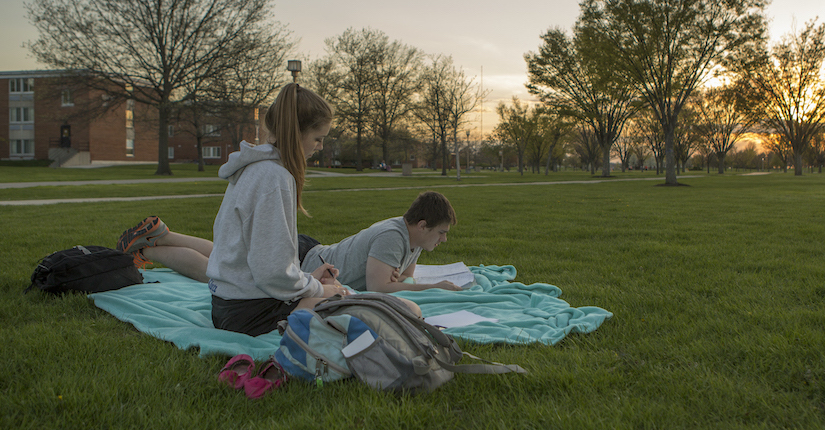
Are you ready to tackle your law school personal statement? Clear and concise writing is a vital skill for law students, but writing about yourself can be daunting. It's hard to winnow your life experiences down to a couple of pages or find one topic to focus on.
Yet, your personal statement is a critical part of the application process . When combined with your resume, application, and LSAT score, it forms a complete picture of who you are and why you're a perfect fit.
With these steps, you'll overcome obstacles while developing prose that supports a favorable application decision.
Does a personal statement matter for law school?
Yes, your personal statement for law school is vital. It provides insights that aren't apparent on your transcripts. Engaging prose helps you stand out in a competitive space resulting in acceptance at your most-desired schools.
For the 2020-2021 academic year, the number of applicants to law schools rose by 1.6%, with 63,206 applicants submitting 381,698 applications, according to the Law School Admission Council . You're competing with students who may have similar LSAT scores , grade point averages, and professional experience. When facing identical transcripts from hardworking students, often the only differentiator is the personal statement.
After all, admissions officers want to know the person behind the hard data. That's where your law school personal statement comes into play. With a standout essay, you capture admissions officers' attention and an amazing narrative sticks in their heads. Your story should emphasize valuable traits, such as:
- Intelligence
- Professionalism
- Persuasiveness
- Thoughtfulness
- Seriousness
How do you write a good law school personal statement?
Writing a great law school personal statement doesn't come without hard work. Although you've written plenty of essays during your college experience, a strong narrative requires genuine reflection. You need to dig deep to uncover an aspect of your life that led to a significant change or put you on your current path.
Of course, intelligent prose doesn't always come out in the first draft. So prepare to spend a good chunk of time building your narrative and adjusting your statement for flow. Starting is often the hardest part of writing. Fortunately, you can follow these steps to nail your law school personal statement.
Review law school personal statement requirements
Begin by scouring the application packet materials and college websites. Look for key information about the length and page format of your personal statement. The guidelines should answer important questions like:
- How long should your personal statement be for law school?
- What is the maximum word count for a personal statement?
- How do you format a personal statement?
Next, write down any required prompts to answer in your essay. For instance, some schools may ask why you're applying or why you want a JD degree. Organize program details using a spreadsheet or project management software like Trello. Create a card or row for each program, then list important facts about its mission, goals, and community.
Also, check to see if any programs offer law school personal statement examples. Read through samples to get an idea of what admissions officers expect. Lastly, some colleges accept other types of statements as well, such as a diversity statement or an addendum. For best results, complete all options.
Diversity statement for law school
A diversity statement defines what makes you different. It sounds or looks similar to your law school personal statement. But, it differs because you don't need to tie up your narrative into a neat package that ends with an epiphany. Instead, it may cover an experience that explains your values or desire to work towards inclusivity.
Law school application addendum
An addendum is a way to overcome lower scores, a gap in education, or other concerns where you fall short in your official papers and transcripts. Addendums are short, concise, and honest. Explain your reason and demonstrate that you've met and overcome your challenge.
Brainstorm potential personal statement topics
Some people prefer to jump right into writing. However, your life story is pretty lengthy, so it's essential to narrow down your subject matter. Focus your attention by reflecting on your life and coming up with some topics to write about. Consider ideas like:
- Personal challenges, hardships, or completed goals
- A turning point in your life
- Unique hobbies or personal interests
- Special achievements or awards, not listed in-depth on your initial application
- A situation or environment that changed you or your values
- A project that got results and you're passionate about
- Your upbringing, culture, education, or a personal or professional experience
While brainstorming, go through your transcripts, application, and resume. Are there any gaps or missing details that your personal statement could cover? Perhaps you listed volunteer work with a local animal shelter on your application. Could you delve into this topic further? Aim to share a unique story where your personal growth is the main focus.
Explore your subject for clarity and insights
Sure, your chosen topic may be fresh on your mind. However, your personal statement for law school is more than describing an event. You need to show admission officers how this experience shaped you. It's vital to dig into how it impacted your values, traits, and feelings.
Many students report spending hours or days considering their topic, digging through memories, and compiling their subject matter. If you have access to photos, documents, or other things that'll jog your mind, then now is the time to pull them out. Sometimes even listening to your favorite songs can help you remember the moment.
Uncover a unique angle
Mark Twain once said that no story ideas are original. That holds true for personal statements as well. Plenty of law school applicants face difficult decisions, adversity, or enlightening experiences. Your essay isn't a retelling of an event. It focuses on your feelings and growth. And the story of you is unique, as no one shares your exact emotions or reactions.
Your goal is to explore an angle that sets your story apart from others. Overcome obstacles by taking a break during brainstorming. Come back to your topic with fresh eyes and hammer out your main idea.
Sum up your idea and start writing
Now you're looking at your topic, an angle, and you've pulled up those old memories. Do your best to sum it up and conclude it with a few sentences. This is your main point, and what every paragraph should lead the reader back to. Use these sentences as a reference point while writing.
Some students prefer to create a general outline before writing. Others produce a few key sentences and start typing. All personal statements for law school use a narrative arc with a clear beginning, middle, and end. Include:
- A captivating introduction that draws the reader into your life
- Body paragraphs that naturally flow towards a conclusion
- A decisive conclusion that delivers a lasting impression
During the rough draft, forget about length, grammar, or other specifics. Instead, just write. Get everything out on the pages. You'll have plenty of time later to refine, clarify, and structure your personal law school statement. Once you're done, read it over, make a few edits, and walk away.
Turn a draft into your personal law school statement
With a rough draft in hand, assess every word to ensure your story meets your objectives. Your goal is to recreate the moment and invite the reader into your account. Mold your rough draft into a final piece by focusing on a coherent structure.
Flow. A logical progression of ideas, with a clear arc, is essential. Your reader should glide through your personal statement naturally.
Length. Eliminate wordy phrases, overly difficult words, and descriptions that don't support your conclusion.
Personalization. Pay attention to subtle differences in law schools, from their communities to purpose. If you can genuinely work this into your personal statement, then do so.
Character decisions. It's okay to include other characters in your personal statement, but ultimately you want to return the focus to yourself.
Revise and edit several times
Few applicants write a stellar personal statement the first time. Get the best results by putting your draft through a comprehensive editing and revision process. This goes beyond using your word processing spell checker. Invest in human and technical tools to ensure the best results. Take steps such as:
- Double-check that your essay meets formatting and length requirements.
- Make sure you've answered any writing prompts.
- Personalize your statement to the specific school and program.
- Use a tool like Grammarly or ProWritingAid to correct grammar and style issues.
- Run your document through the Hemingway App to catch hard-to-read sentences and more.
Lastly, it’s essential to get help editing your personal statement. Fresh eyes and unbiased opinions allow you to refine your narrative. Obtain assistance from law school forums, writing centers, and social media communities. Or, ask fellow students or mentors to review your essay.
Create an impressive law school personal statement
Make your application packet stand out with a genuine and captivating personal statement for law school. Although writing your essay may seem like a challenging task, once you break it down into steps, it'll be easier to develop a cohesive statement that's sure to win admission officers’ attention.
Information for:
- Request Info
- ONU Law at a Glance
- Dean's Office and Administration
- Getting to Know Ada
- Law Lecture Series
- Consumer Information (ABA Required Disclosures)
- JD Curriculum and Learning Objectives
- Online JD Program
- Clinics and Externship Program
- Academic and Bar Success Program
- Certificate Tracks
- Academic Calendar
- Law Review and Other Publications
- Tuition and Financial Aid
- Veterans and Military Aid and Resources
- Accepted Students
- Summer Starter Program
- Admissions Blog
- Career & Professional Development
- Health and Wellness Resources
Lawschooli Admissions Consulting
Law school personal statement editing.
Stand Out From The Crowd.
Lorem ipsum dolor sit amet, dictas incorrupte ne pro. Qui id iusto commune. No usu saepe patrioque constituam, consul utroque inimicus in sit, at sit natum admodum. Ut quaeque eleifend argumentum vim, viderer adipiscing mea et.
Numquam percipit praesent sit ea, no suas intellegat philosophia vim, esse feugiat ei vel. Sed cu verterem consetetur, ad nihil labores adolescens pri, te volutpat scriptorem pro. Quo vero malorum interpretaris ne.
Graece delicata electram at vim. No verear interpretaris has, pri te impedit sensibus disputationi. Ut nibh perfecto salutatus vim. Mel in epicuri accusamus, qui ex zril molestie aliquando. Enim mandamus no nam.
Our Process
4 Steps to a Great Law School Personal Statement
Brainstorming
The first step to writing a good personal statement for law school is selecting a topic to write about. Choosing a good topic/theme for your essay is one of the most important (and difficult) aspects of writing an effective law school personal statement. Our 30-minute brainstorming session gives you the opportunity to bounce some ideas off of Evan or Josh, who will help guide you in the right direction.
A good topic can provide law schools with valuable insight and set you apart from the thousands of other students competing for admissions. Pick a bad topic to write about and your essay is doomed before you even start writing.
Substantive Edit
Once you have a draft of your essay, our experienced editors will make sure you're on the right track. This developmental edit takes a big-picture overview of your essay and provides objective, actionable feedback that will help ensure that your essay has the desired impact on readers.
We'll read your essay from the perspective of a law school admissions officer. Does your topic work? Is the tone, style & flow of your essay hitting the right notes? Do you have a strong introduction and conclusion? Are there portions that need to be cut or expanded? Is it well-organized, precise, and compelling? Are your points well-supported?
Proofreading Edit
Once you have a strong topic that you've developed into a compelling essay and you’re happy with the substance of your personal statement, now it is time to go through your essay with a fine-toothed comb . During the proofreading phase, we take a close look at your essay to ensure that is accurate and error-free .
We go through your writing, word-by-word, looking for technical errors and omissions . We’ll look carefully for mistakes in spelling, punctuation, grammar, sentence structure, and word usage in order to improve its accuracy and readability .
Final Polish
After you've made any final changes, it is always a good idea to have an experienced editor do a quick final review before you hit “send.”
During the “final polish” phase, we make sure your essay is typo-free. Two editors will review your work to ensure that it is well-formatted and free of spelling errors and grammatical mistakes, resulting in a final draft that you can confidently submit to law schools.
Limited-Time Introductory Pricing
30-Minute Brainstorming Session
Topic selection / essay strategy, $99 / session.
- 1 Half-Hour Session
- Phone or Web Conference
- Prior to our meeting, you'll be given a list of question prompts designed to generate potential topics
- Together, we will review your answers and identify ideas most likely to lead to an effective essay
- We will consider your unique background, strengths, and weaknesses to develop an optimal essay strategy that complements the rest of your application package in order to deliver a consistent, compelling message to admissions officers
Review & Feedback
$139 / essay.
- Overall Essay Evaluation
- Ensure content and topic are effective, organized, engaging & clear
- Improve overall substance, style, and formatting
- Focused on conceptual clarity, precision, tone, structure, etc.
- Results in a more focused, organized, well-argued & persuasive essay
Revise & Perfect
- Comprehensive Line-By-Line Proofreading
- Ensure content is free of error, omission, inconsistency & repetition
- Improve overall accuracy, readability, and fitness
- Focused on technical accuracy, grammar, spelling, punctuation, word choice, etc.
- Results in a more accurate, consistent, error-free & essay
A Quick Check Before Hitting Send
$69 / essay.
- Quick, Basic Proofreading
- Ensure final draft is free of spelling errors & grammatical mistakes prior to submission
- Focused on typos and grammar
- Results in a final draft that you can feel confident in
Comprehensive Personal Statement Package
From brainstorming through final edit, $599 / essay, $1100 value (save over $500).
- Unlimited Edits
- Unlimited Brainstorming Sessions
- Unlimited Substantive Edits
- Unlimited Technical Proofreading Edits
- Unlimited Final Polish Edits
To describe something in great detail to the readers, the writers will do my essay to appeal to the senses of the readers and try their best to give them a live experience of the given subject.

Gain recognition with the help of my essay writer
Generally, our writers, who will write my essay for me, have the responsibility to show their determination in writing the essay for you, but there is more they can do. They can ease your admission process for higher education and write various personal statements, cover letters, admission write-up, and many more. Brilliant drafts for your business studies course, ranging from market analysis to business proposal, can also be done by them. Be it any kind of a draft- the experts have the potential to dig in deep before writing. Doing ‘my draft’ with the utmost efficiency is what matters to us the most.

If you can’t write your essay, then the best solution is to hire an essay helper. Since you need a 100% original paper to hand in without a hitch, then a copy-pasted stuff from the internet won’t cut it. To get a top score and avoid trouble, it’s necessary to submit a fully authentic essay. Can you do it on your own? No, I don’t have time and intention to write my essay now! In such a case, step on a straight road of becoming a customer of our academic helping platform where every student can count on efficient, timely, and cheap assistance with your research papers, namely the essays.
Finished Papers

Compare Properties
Dr.Jeffrey (PhD)

- Individual approach
- Fraud protection
Gain recognition with the help of my essay writer
Generally, our writers, who will write my essay for me, have the responsibility to show their determination in writing the essay for you, but there is more they can do. They can ease your admission process for higher education and write various personal statements, cover letters, admission write-up, and many more. Brilliant drafts for your business studies course, ranging from market analysis to business proposal, can also be done by them. Be it any kind of a draft- the experts have the potential to dig in deep before writing. Doing ‘my draft’ with the utmost efficiency is what matters to us the most.
Emilie Nilsson
- Member Login
What is the native language of the person who will write my essay for me?
- Password reminder
- Registration
How to Get the Best Essay Writing Service
Professional essay writing services.

IMAGES
VIDEO
COMMENTS
Polishing your law school personal statement is one of the hardest steps in the admissions process. Don't hit Submit until you've run your essays by the experts. Browse our Law School Personal Statement Editing Services for details on how we can help you clarify, clean up, and deliver the most impressive essays possible.
Trust us with your essay, and let us prove to you the power of The Master Edit. Law School Personal Statement Editing. All. The Master Edit—Money Back Guarantee—Law School. from $29.95. View Options. Zoom Brainstorming Session—Law School. from $99.95. View Options.
In most law schools, applicants are required to submit a personal statement and some optional components, including character and fitness questions, resume, addendum, and other documents. Be sure to read your school's application instructions carefully and let our editors help you polish each document. Choose Offer.
Part 4: Law school personal statement brainstorming. ... For big changes, rewrite instead of editing. This one can be a bit of a pain after investing all the time you have, but if you decide to make a large change in form or content, start again with a blank page. It can be tempting to preserve your existing structure and just slot in the ...
A week of access to a knowledgeable experienced editor via email who will work with you to help improve your essay even more. A second full Elite Service edit of the same essay, incorporating all of the changes you discussed with your editor. Turnaround time: 24 or 48 hrs. Prices start at: $199.00+. Buy Now More Info.
You can receive your feedback in as little as 12 hours or less. Get peace of mind knowing your personal statement is the best it can be, and boost your chances of getting accepted at your top schools. Turnaround. Pricing. 12 hours. $0.096 per word. 24 hours. $0.070 per word. 72 hours.
Be precise and concise. Legal writing is known for its clarity and brevity, so practice these skills in your personal statement. Aim to keep it between 500 and 700 words, as brevity is the soul of wit (and law school applications). 5. Revision: The Art of Legal Editing.
For example, if a school expects no more than two pages, 11-point font, 1-inch margins and double spacing, make sure to format your personal statement precisely according to those specifications ...
All rates are expressed and billed in U.S. dollars. Our regular rates provide two-business-day turnaround for each round of editing. Services are subject to availability. All prices are subject to change without notice. Your personal consultant will polish your law school essays to make them clear and enjoyable to read. Submit compelling essays.
Professor at Syracuse University. Starting at $7.00 USD per page. View Precision_Editing. Browse More Personal Statement Editors Rated 4.949 Out of 5 Stars Based on 8,837 Reviews. Graduate School Undergraduate Medical School Business School Law School.
Ensure that you answered the essay questions they provided. Remember to put the "personal" in the personal statement - use a personal stories/anecdotes. DO NOT approach this as a "Statement of Purpose" ( which would be an essay about why you want to pursue a law degree) unless the law school essay prompt indicates to do so. Try to ...
Editing Your Personal Statement. Once you've got that first draft out of your system, it's time to edit and polish your work. It wouldn't hurt to take a couple days away from your essay, and then come back and review it again. ... Your law school personal statement is your chance to showcase your individuality and provide more information ...
At Scribendi, we understand the significance of a well-written personal statement. Our team of experienced editors is dedicated to enhancing your writing and ensuring that your personal statement is error-free, clear, and impactful. Get more than just grammar and punctuation; get Structural Editing and constructive feedback to strengthen your ...
In brief, here's what your law school personal statement will need in terms of format: Overall: No title, 11- or 12-point Times New Roman font, one-inch margins. Header: Your name, your LSAC number, and "Personal Statement" with a page number, formatted as either one or three lines. Check with your school's requirements.
Law School Personal Statement Example #1. When I was a child, my neighbors, who had arrived in America from Nepal, often seemed stressed. They argued a lot, struggled for money, and seemed to work all hours of the day. One day, I woke early in the morning to a commotion outside my apartment.
Admissions Consulting. Our Admissions Consulting packages entail start-to-finish help on five different applications, including unlimited edits on every essay, unlimited strategy sessions, and unlimited access to your consultants. Depending on the package you purchase, we'll match you with a professional writer or a former law school admissions ...
Turn a draft into your personal law school statement. With a rough draft in hand, assess every word to ensure your story meets your objectives. Your goal is to recreate the moment and invite the reader into your account. Mold your rough draft into a final piece by focusing on a coherent structure. Flow.
I actually used a personal statement editing service for my law school applications and I would highly recommend it! The service I used was very affordable and they did an amazing job helping me to edit and improve my essay. The final product was really polished and professional, which made me feel confident submitting it to schools.
The first step to writing a good personal statement for law school is selecting a topic to write about. Choosing a good topic/theme for your essay is one of the most important (and difficult) aspects of writing an effective law school personal statement. Our 30-minute brainstorming session gives you the opportunity to bounce some ideas off of Evan or Josh, who will help guide you in the right ...
Our professional essay writer can help you with any type of assignment, whether it is an essay, research paper, term paper, biography, dissertation, review, course work, or any other kind of writing. Besides, there is an option to get help with your homework assignments. We help complete tasks on Biology, Chemistry, Engineering, Geography ...
Moscow City Teachers' Training University (Russian: Московский городской педагогический университет) is a public university located in Moscow, Russia. It was founded in 1995. History. In 1993, the Moscow Department of Education proposed to the Russian Ministry of Education a project to create a pedagogical university on the basis of several ...
Progressive delivery is highly recommended for your order. This additional service allows tracking the writing process of big orders as the paper will be sent to you for approval in parts/drafts* before the final deadline. What is more, it guarantees: 30 days of free revision; A top writer and the best editor; A personal order manager.
Definitely! It's not a matter of "yes you can", but a matter of "yes, you should". Chatting with professional paper writers through a one-on-one encrypted chat allows them to express their views on how the assignment should turn out and share their feedback. Be on the same page with your writer! Bathrooms. 2.